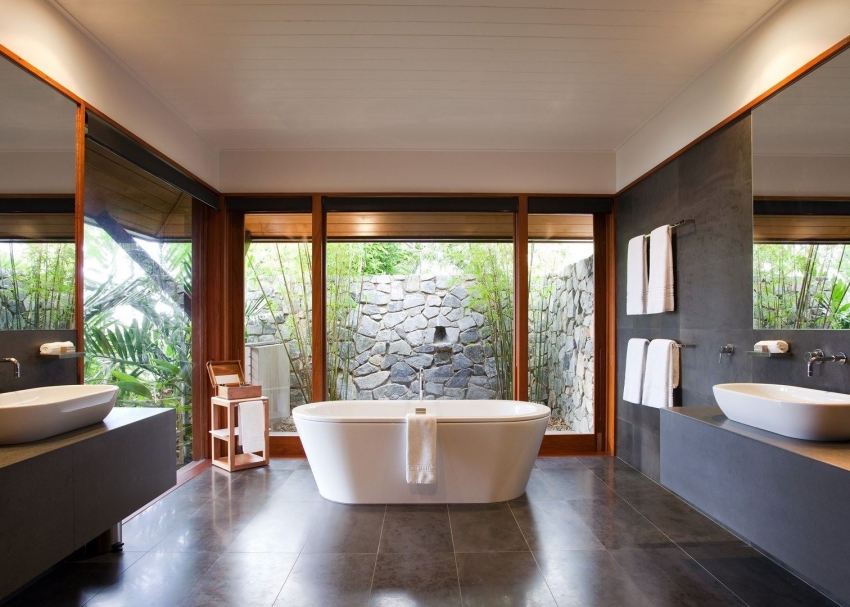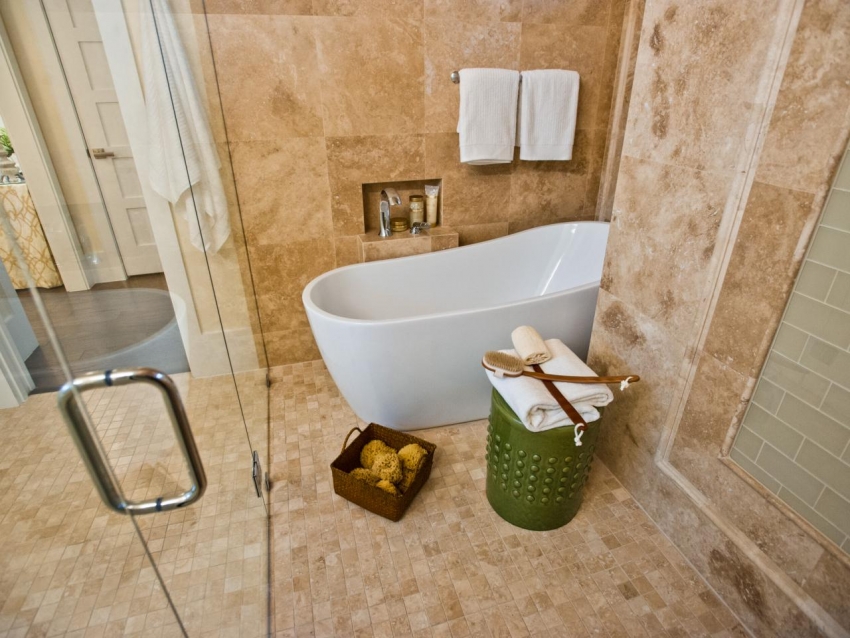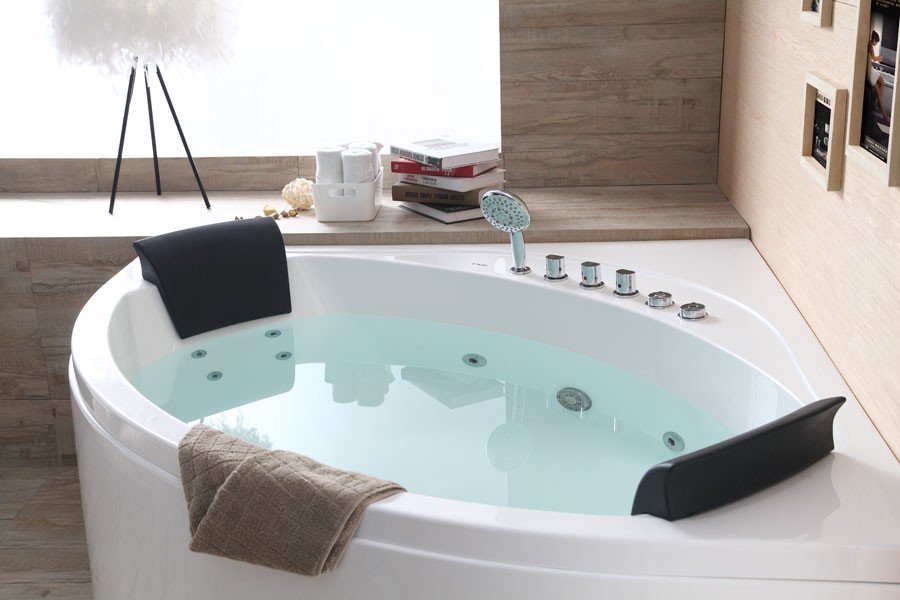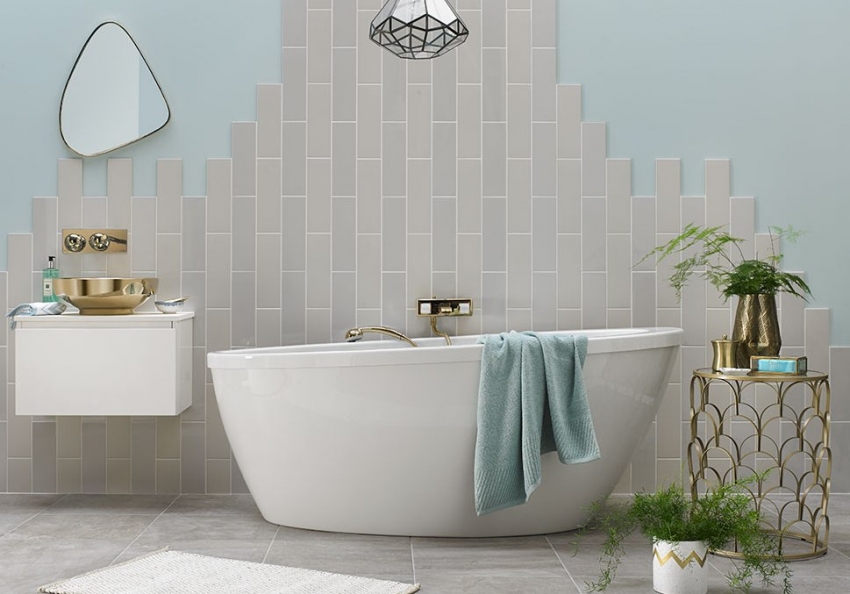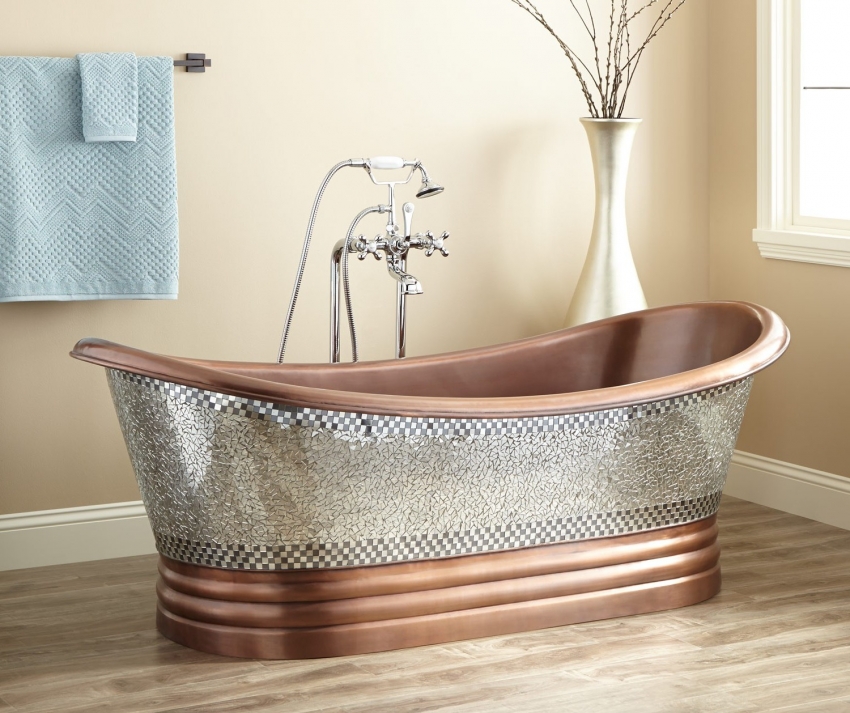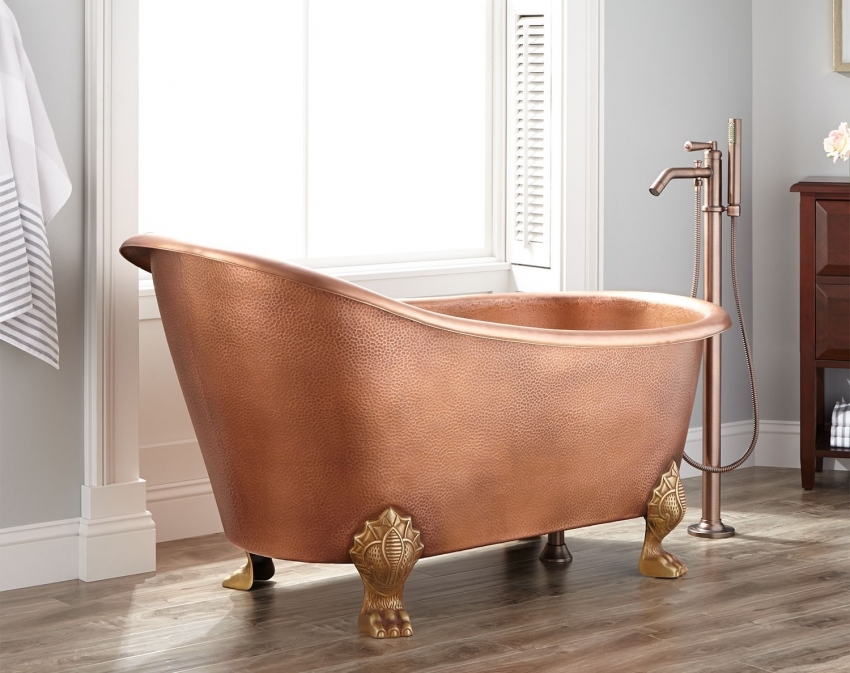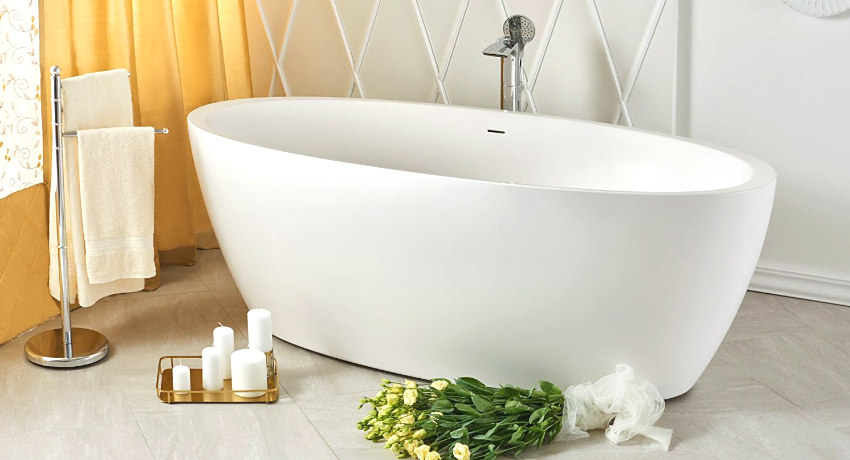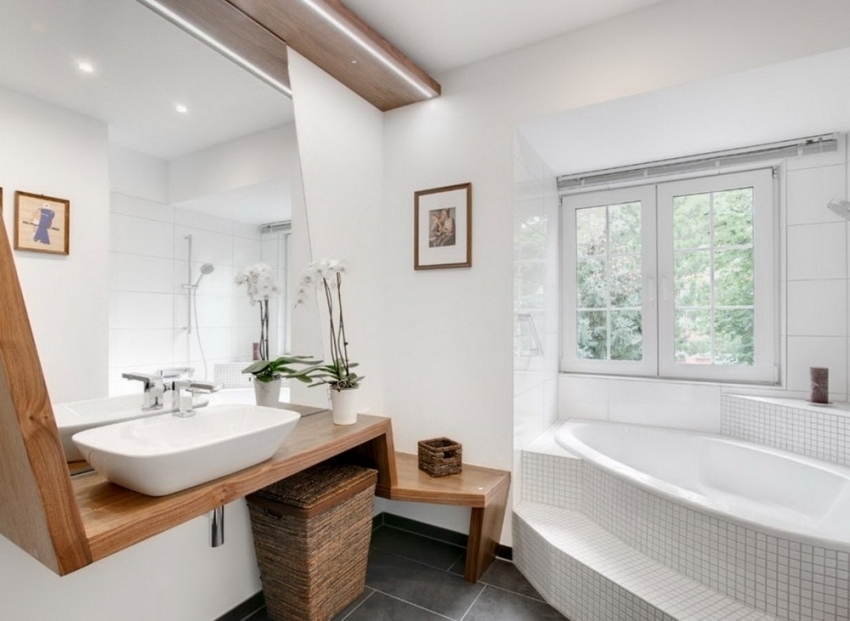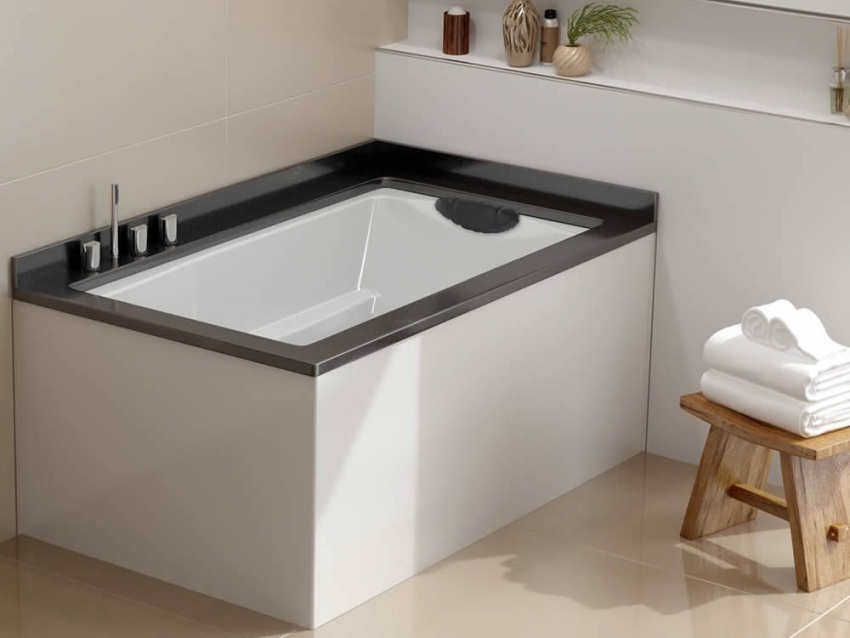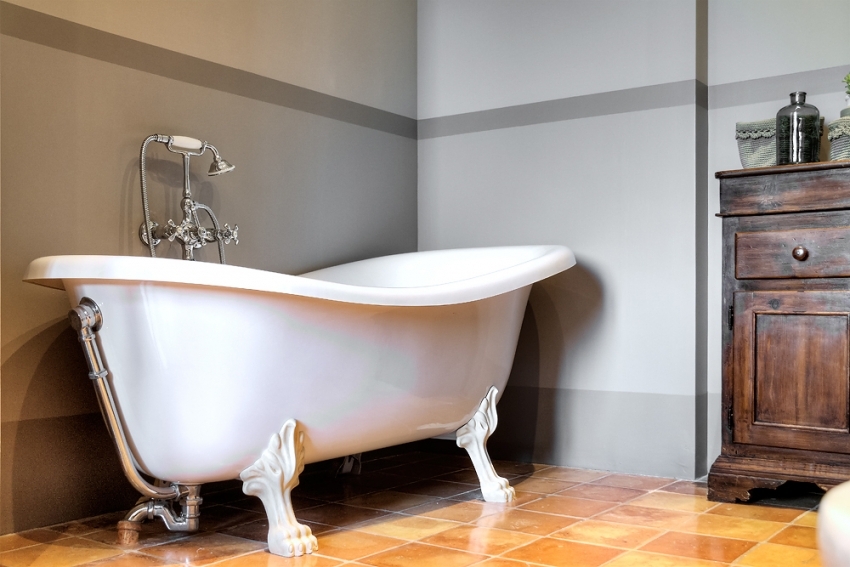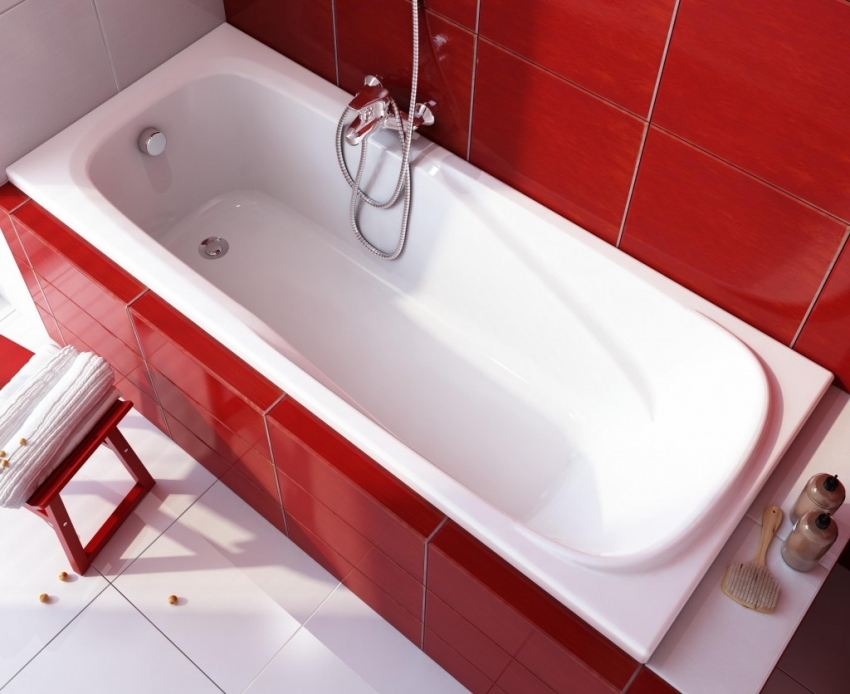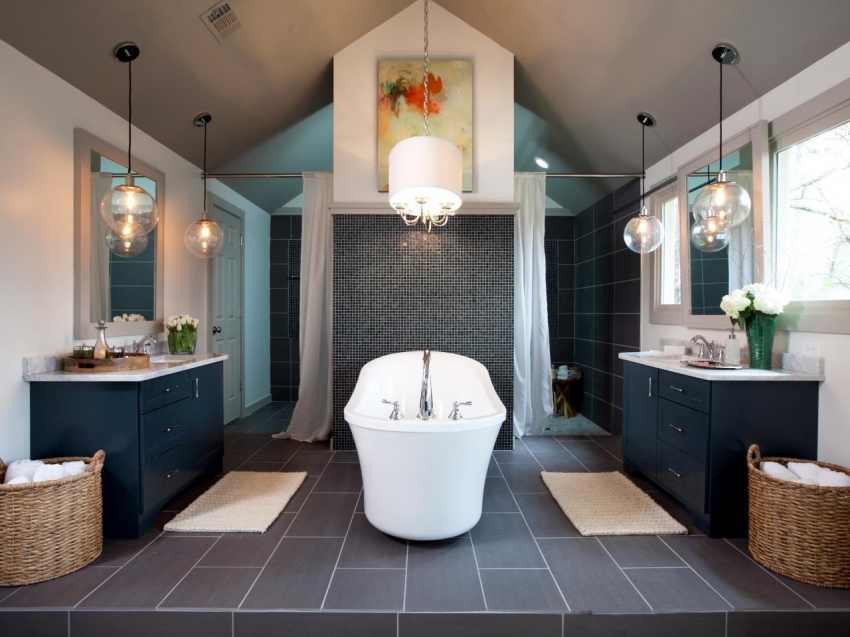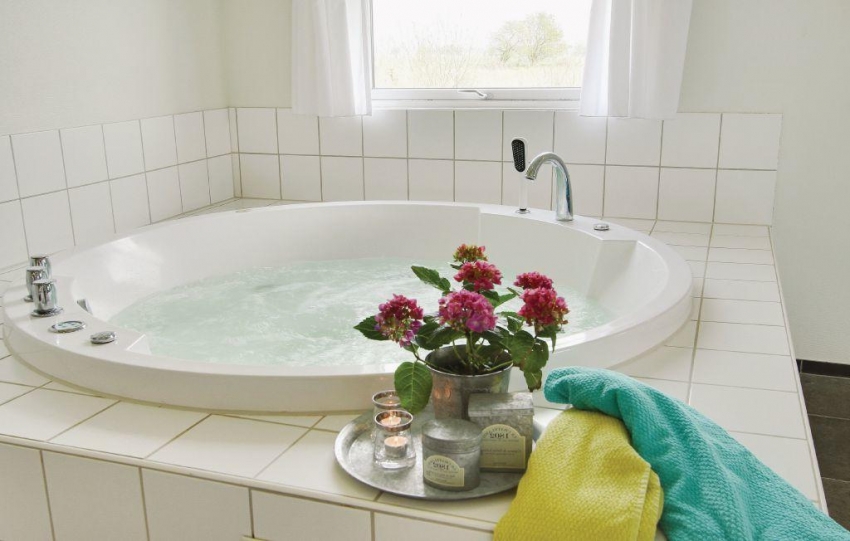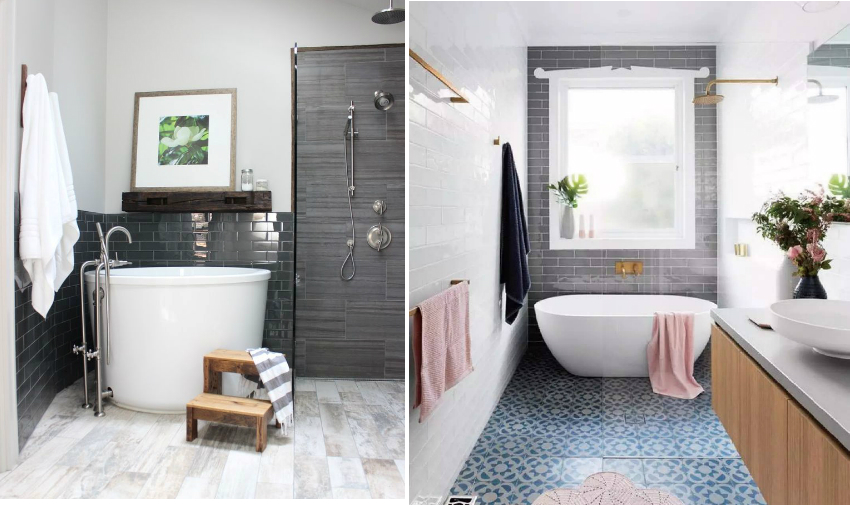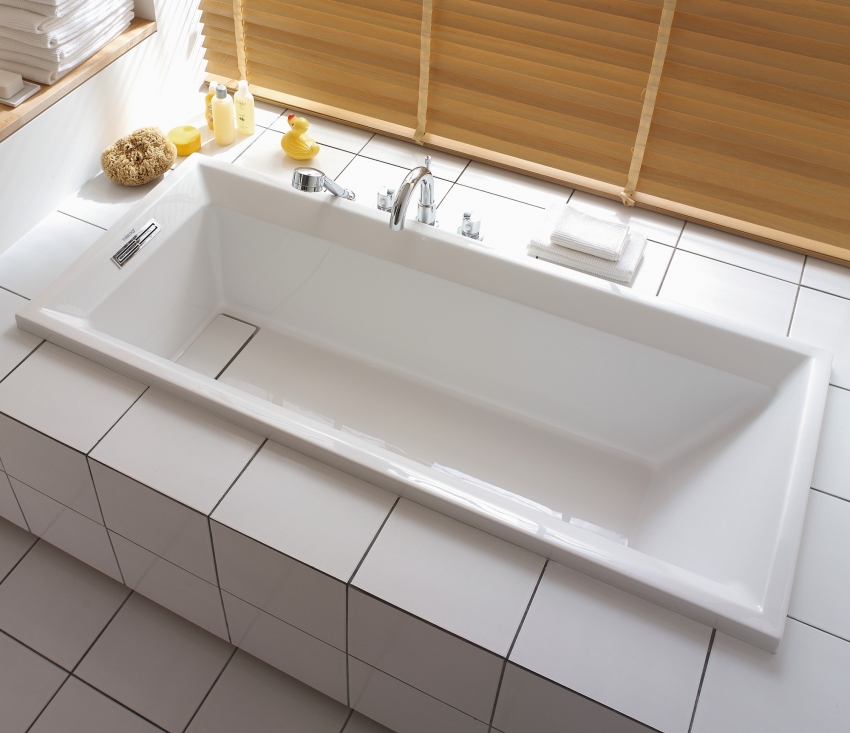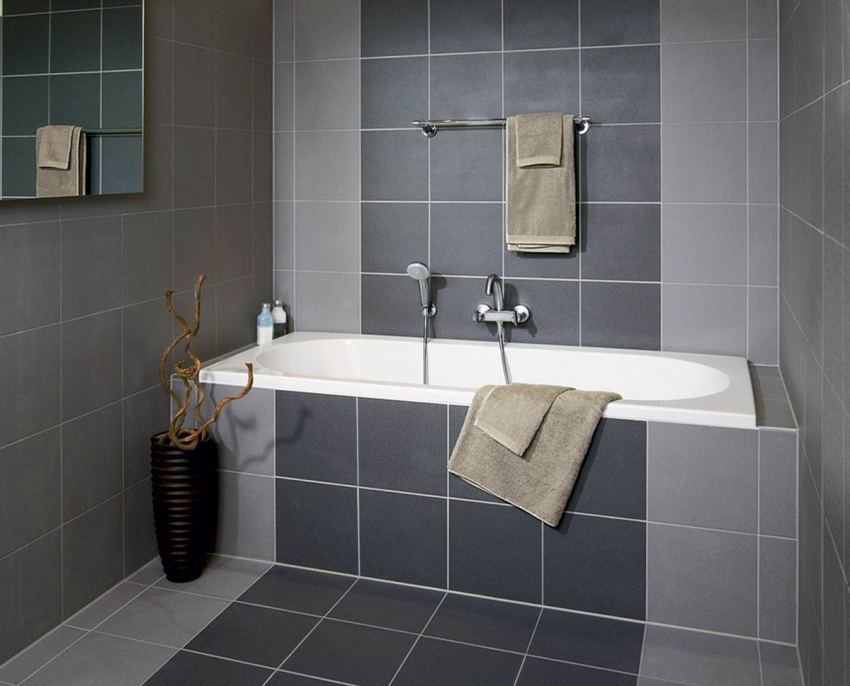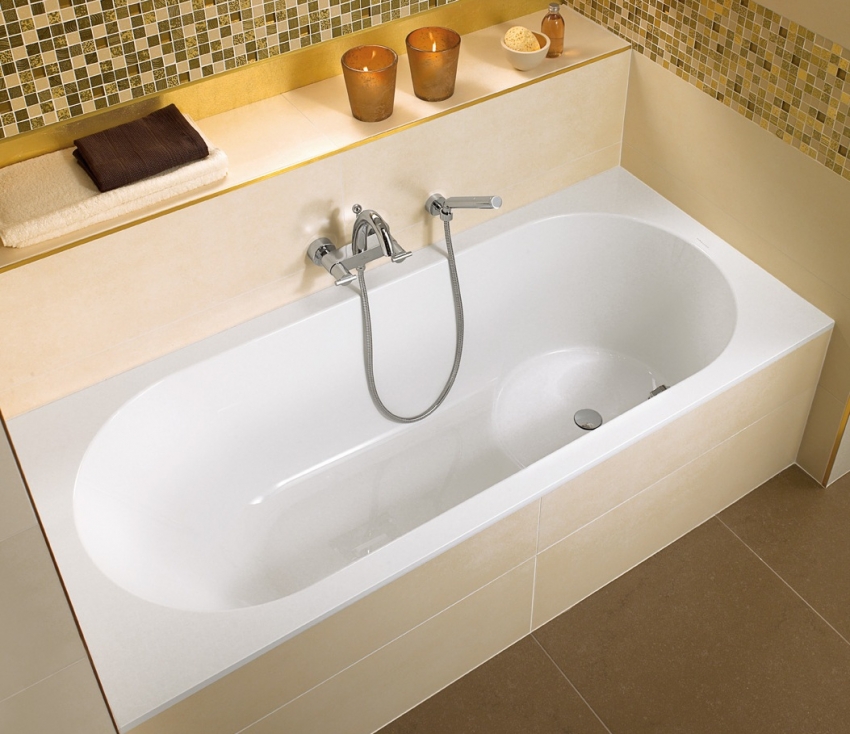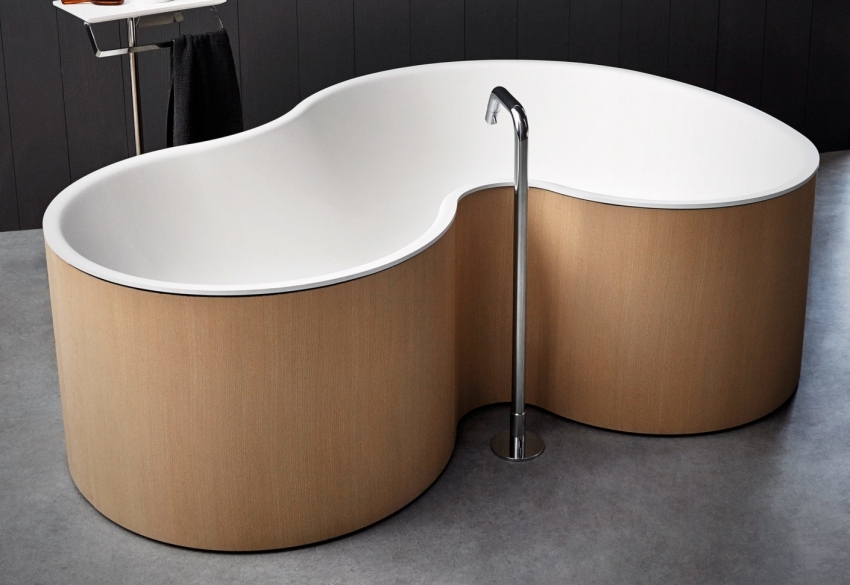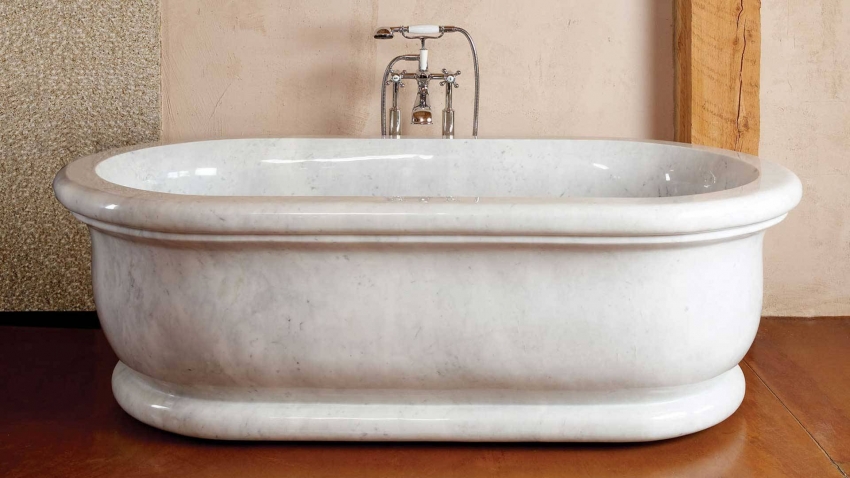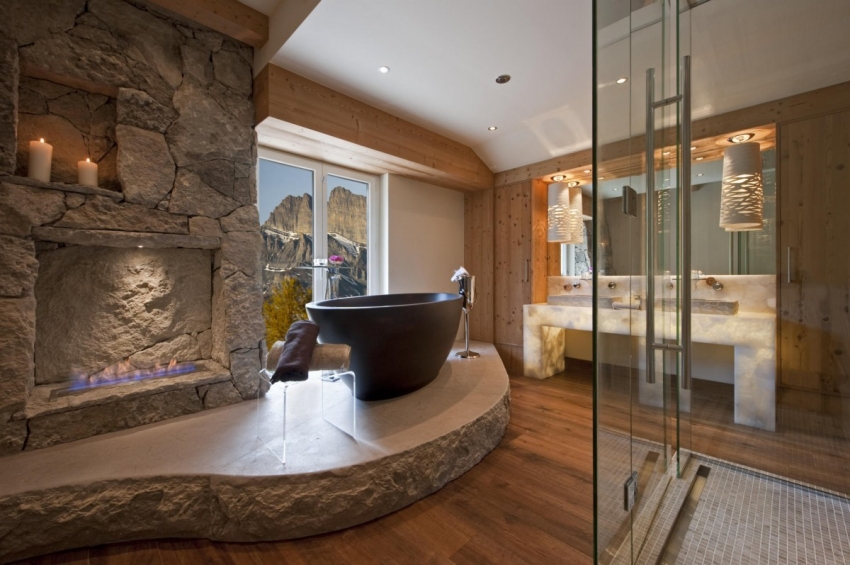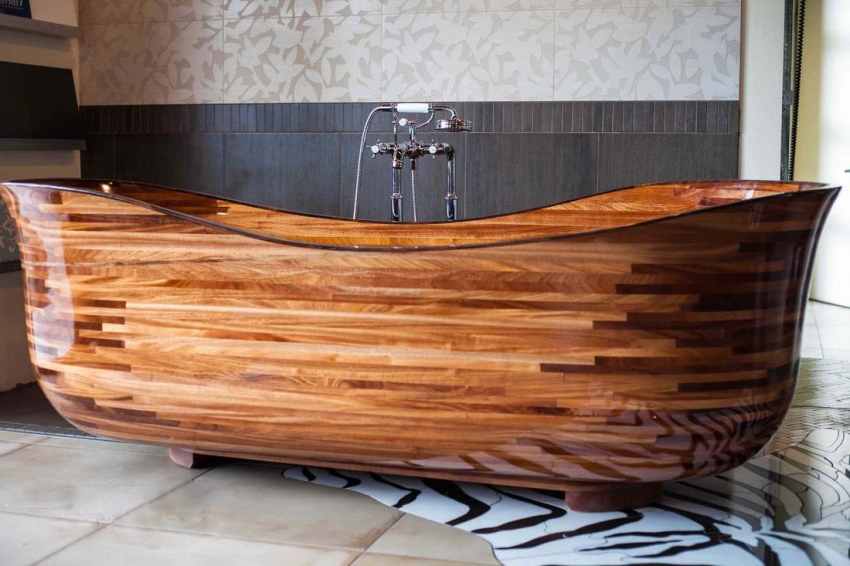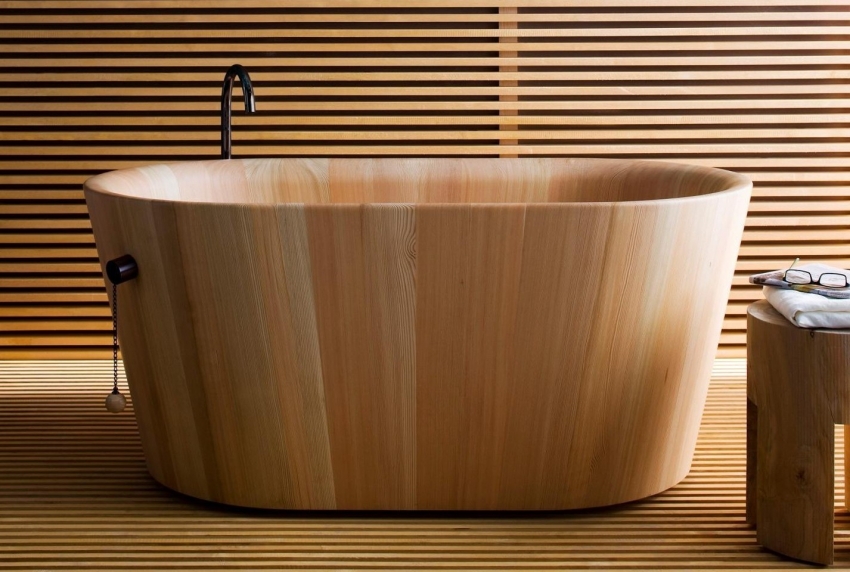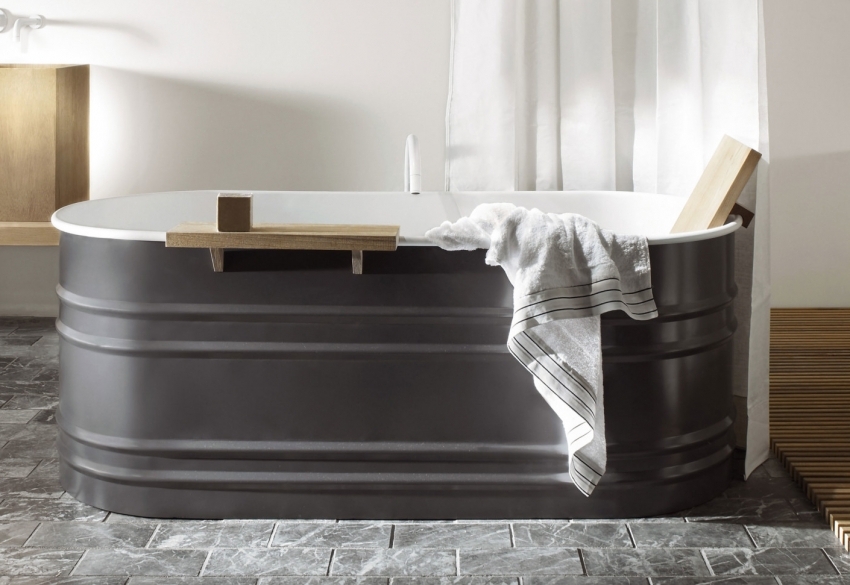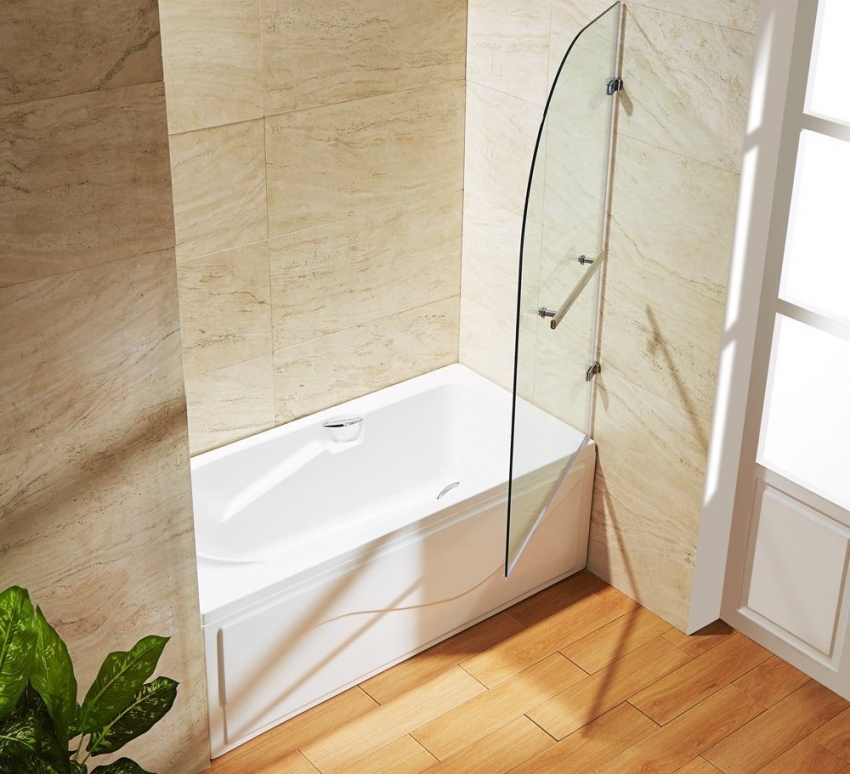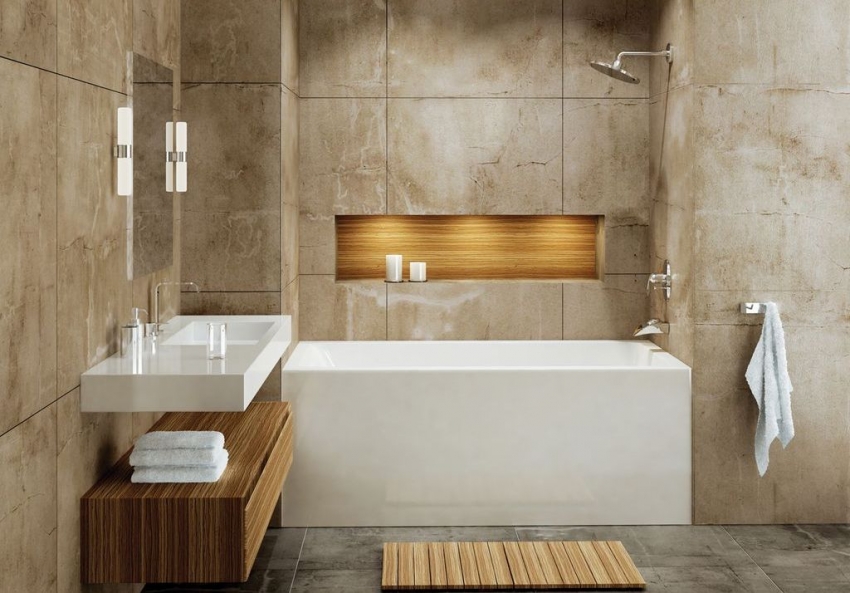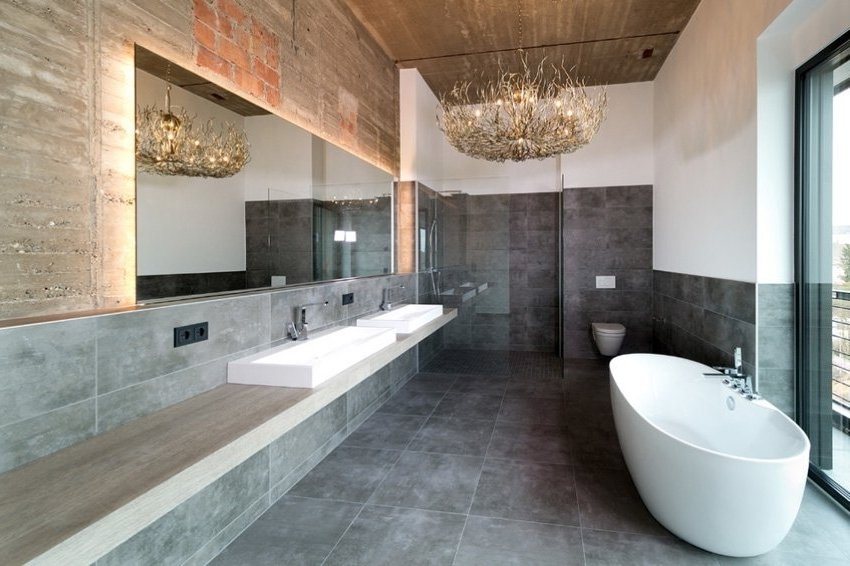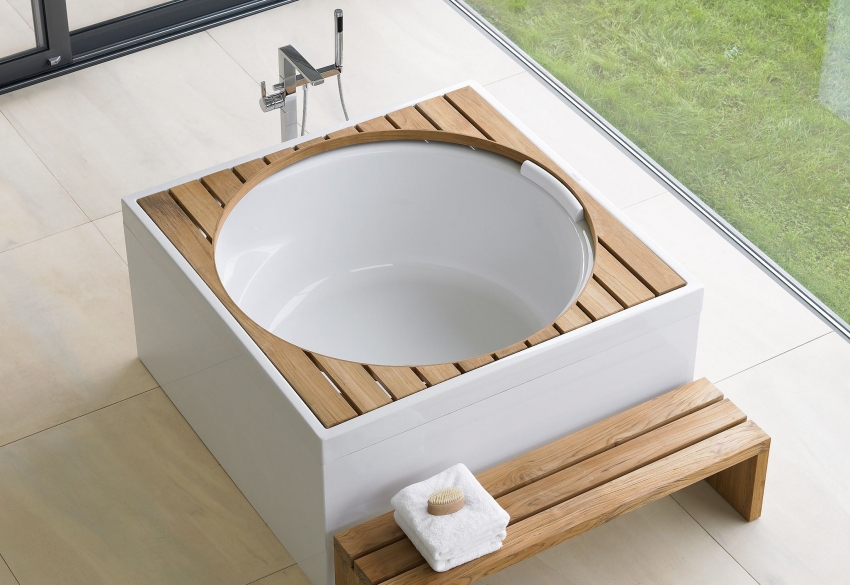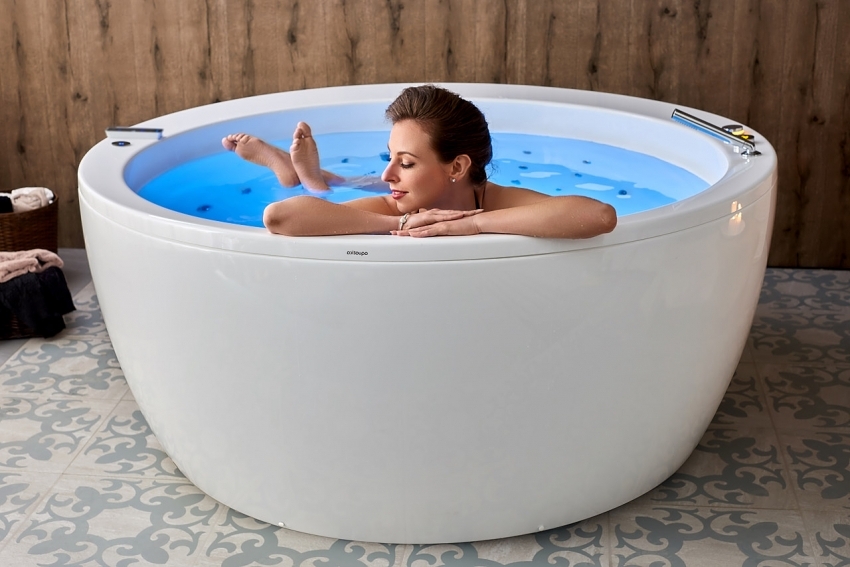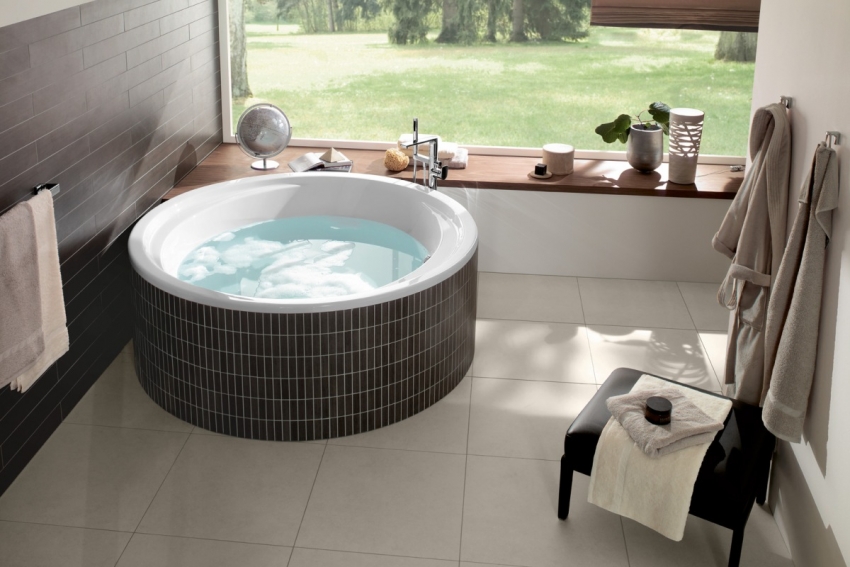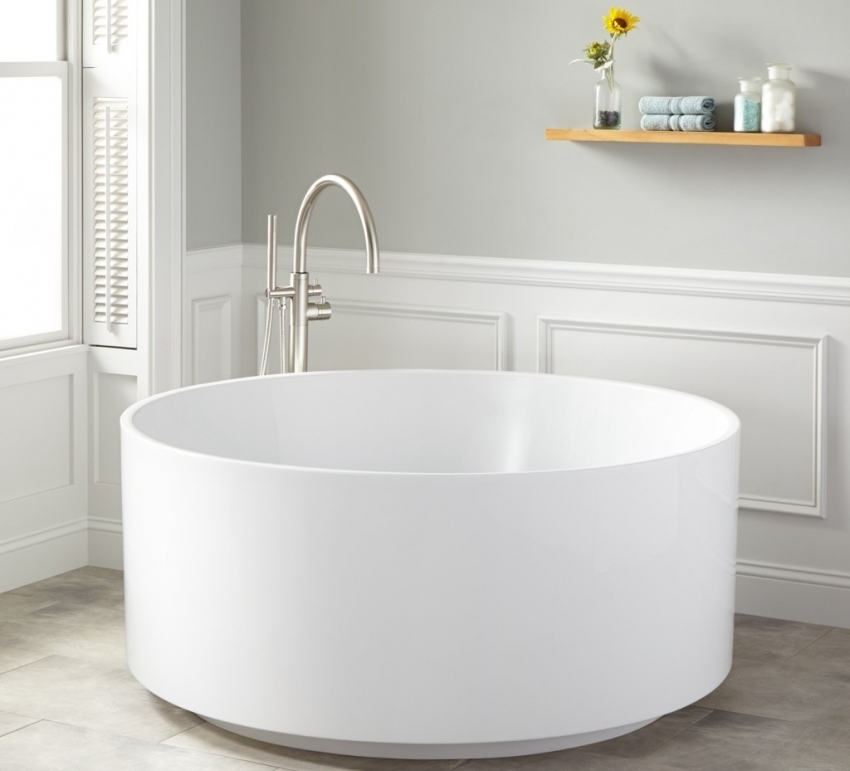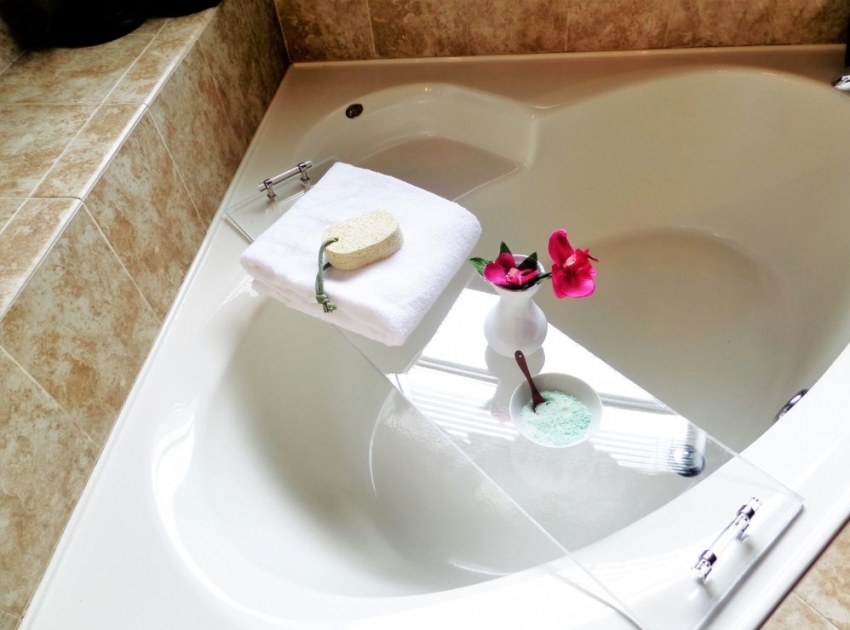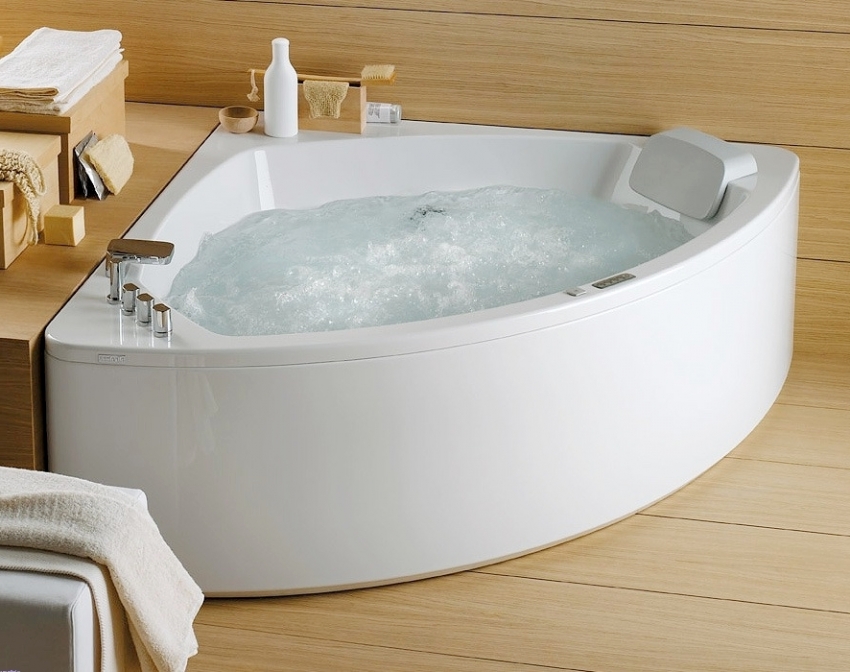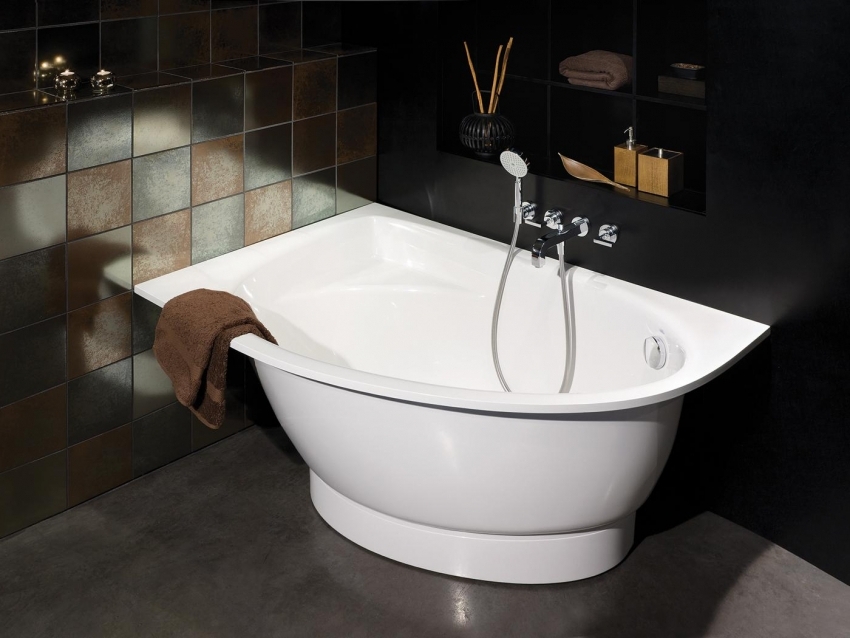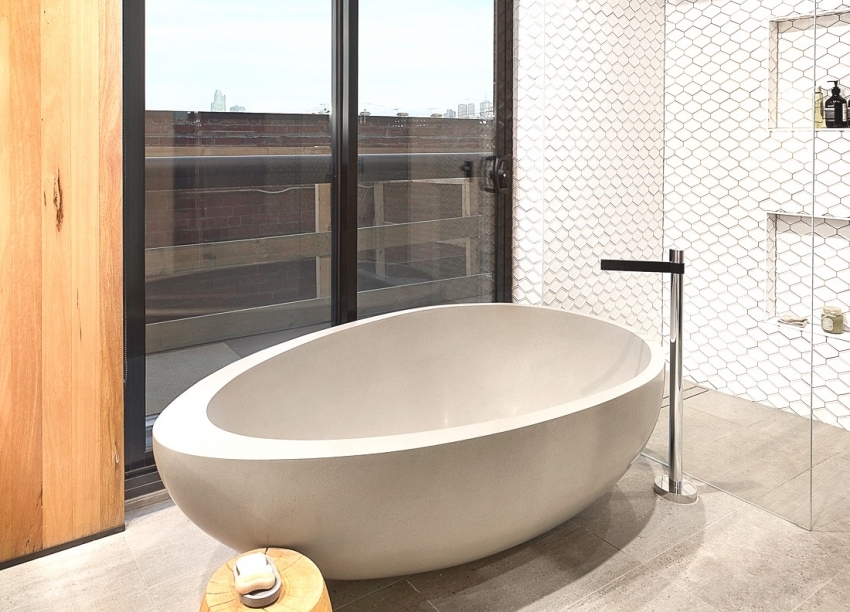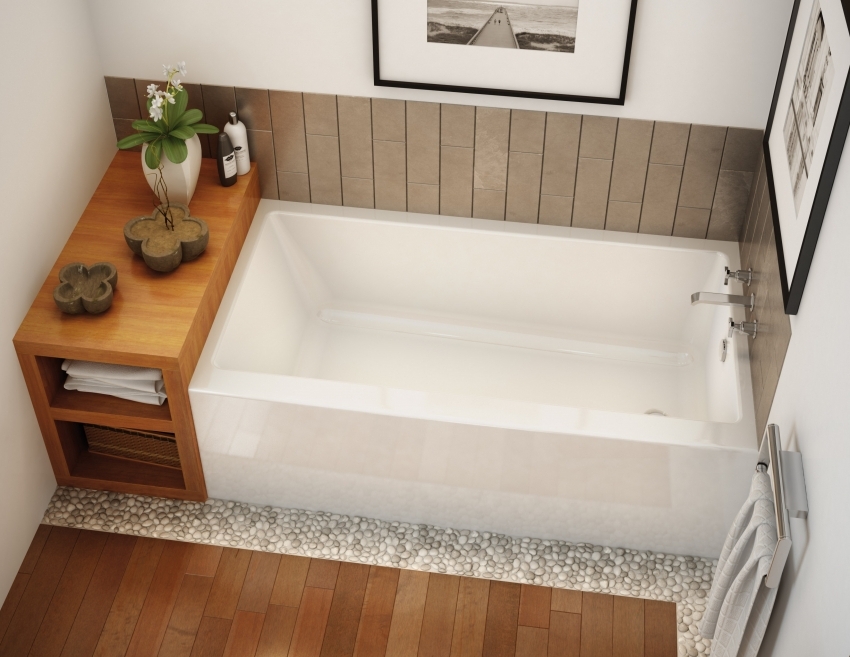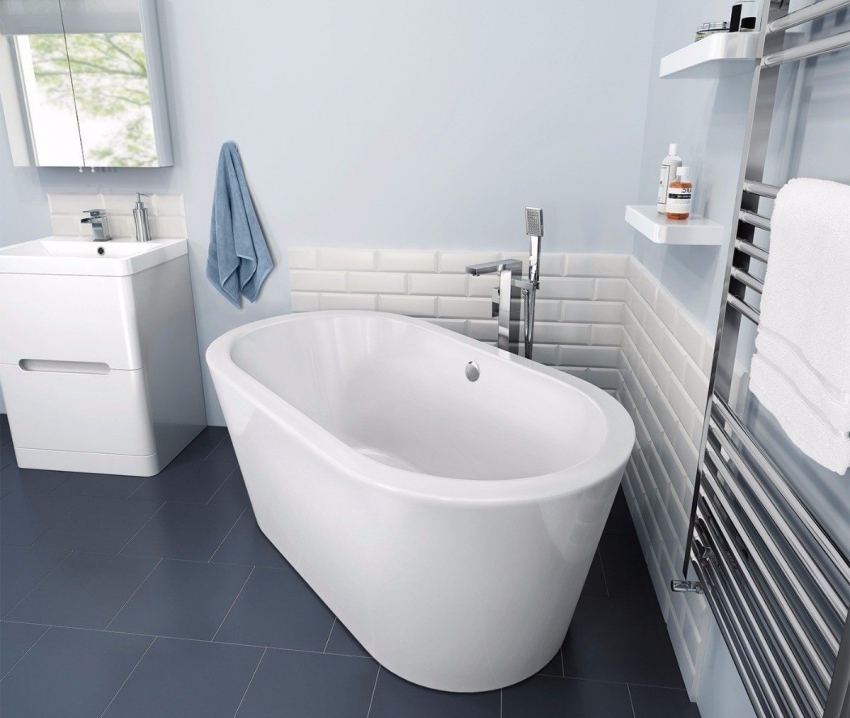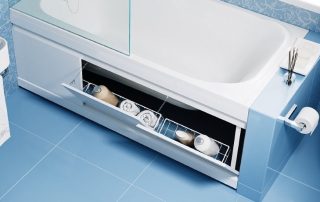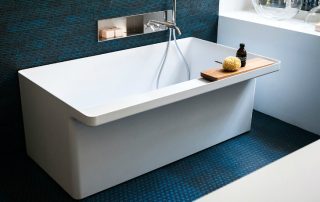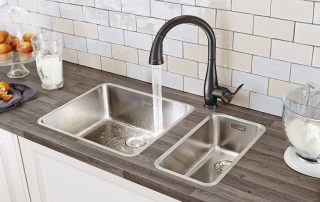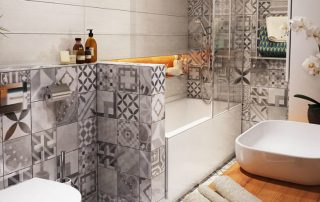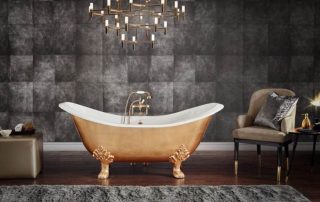In the past, bathroom bathtubs were only sized for practical reasons. However, today there are several criteria that buyers of these products pay attention to. In addition to dimensions, the material of the bath is very important, as well as its shape. Many products are equipped with special hydromassage equipment, which also differs in its characteristics.
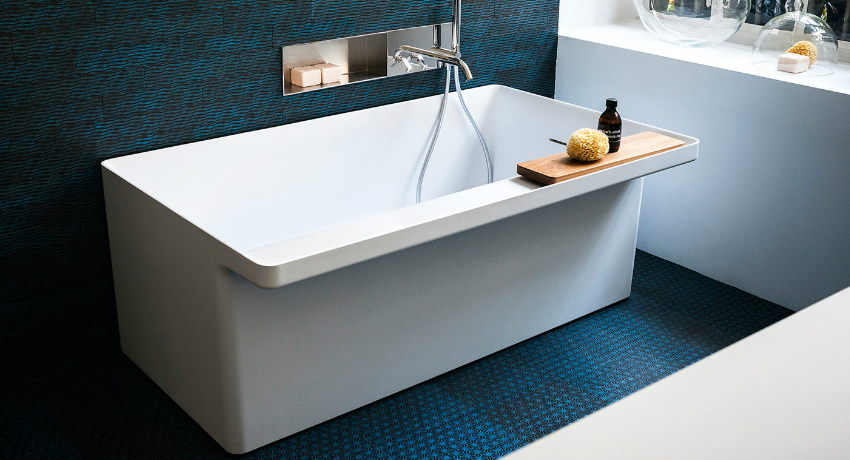
Modern bathroom models allow you to beautifully equip the bathroom and comfortably take bath procedures
Content [Hide]
- 1 Types of bathtubs for bathrooms
- 1.1 Cast iron baths - features and tips for choosing
- 1.2 How to choose a cast iron bathtub?
- 1.3 Steel baths - an alternative to cast iron
- 1.4 Acrylic bath - a modern option for the bathroom
- 1.5 Where to buy bathroom bathtubs and tips for use
- 1.6 Quaril bathtubs for bathrooms
- 1.7 Ceramic baths - exclusive products
- 1.8 Artificial stone baths
- 1.9 Bathroom bathtubs made of natural stone and exotic materials
- 2 Bathtub sizes for bathrooms
- 3 Corner baths - practical and compact
- 4 Small bathtub for small bathroom
- 5 Huge bathtubs for bathrooms: photos and characteristics
- 6 Which bath to choose? Bath Tips
- 7 Bathtub prices for bathrooms
Types of bathtubs for bathrooms
Having a spacious bathroom makes choosing a bath much easier. But in the modern world, small apartments with small bathrooms of standard sizes are much more common. When choosing a bathtub for a room with limited space, it is necessary to study all the nuances and tricks that will allow you to choose equipment of the minimum size without losing comfort.
Before buying a bath, you need to pay attention to 4 main parameters:
- product dimensions;
- the form;
- material of manufacture;
- the presence of hydromassage or its absence.
All these factors make it possible to simplify the selection of this plumbing equipment. Last but not least, you need to decide on the color of the bathtub, as well as the auxiliary decor elements. On the Internet, you can find common bath models. There you can also select certain equipment and buy. Which bathrooms are the most popular today?
Today, acrylic models of standard sizes are very popular among consumers. This material has good technical characteristics and is quite cheap.Much depends on the material from which the bath is made: the time and complexity of the installation, the rate of water cooling, as well as the operational life.
Note!Although cast iron products are losing popularity every year, they have the longest shelf life. It is also difficult to leave a scratch or other damage on such models.
Bath design is also an important selection criterion. Bath design can be very different. Many companies sell products that are equipped with handles (for convenience), mirrors, and other accessories. The choice of the color scheme of the bowl completely depends on the taste preferences of the owner of the apartment and the characteristics of the particular interior of the bathroom.
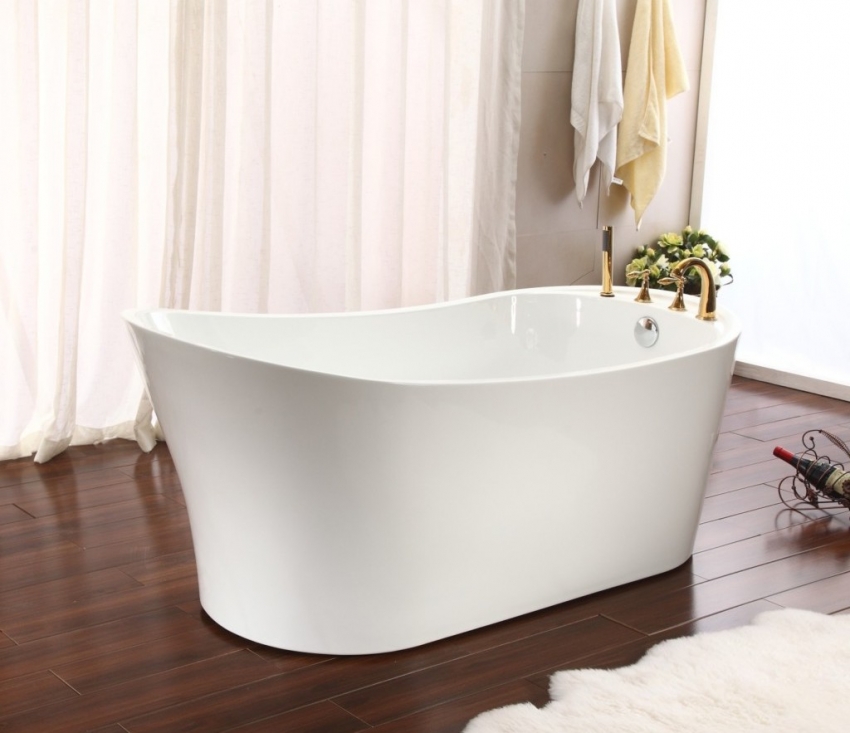
Despite the fact that deep baths are not as popular as conventional models, this type of bowl is very convenient to use.
Cast iron baths - features and tips for choosing
Models made of cast iron have recently lost their popularity. This is due to the development of industry and the introduction into production of new materials that have better characteristics at the same price. But, nevertheless, cast iron models are still in certain demand.
Cast iron products do not differ in a wide range of models. On the market you can find cast iron baths of the following shape:
- rectangular;
- ovoid (oval).
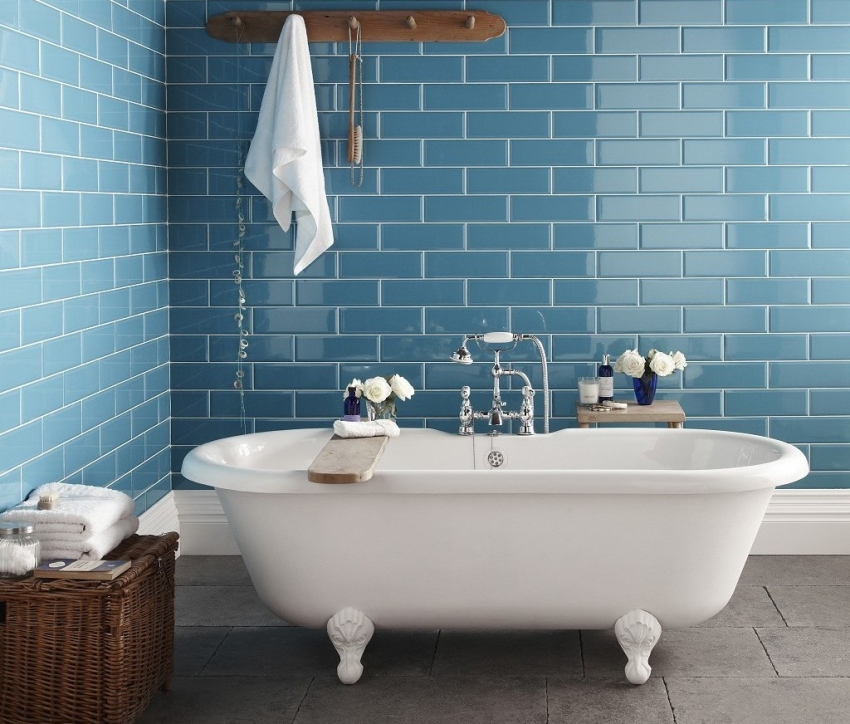
Cast iron baths are very susceptible to aggressive cleaning agents, therefore, the choice of chemistry for cleaning such a bowl should be approached with care
Cast iron baths are heavy, which makes them difficult to transport and install. Depending on the dimensions, there are models with a mass of 70 to 200 kg. Caring for such models excludes the use of abrasive cleaning agents that can damage the enamel.
The main advantage of such a bath is its low thermal conductivity. The temperature of the heated water in such a design decreases by about 5-10 ° C in 1 hour. And they are also quite durable and have good soundproofing qualities when drawing water. The cast iron model is one of the most affordable today in terms of cost.
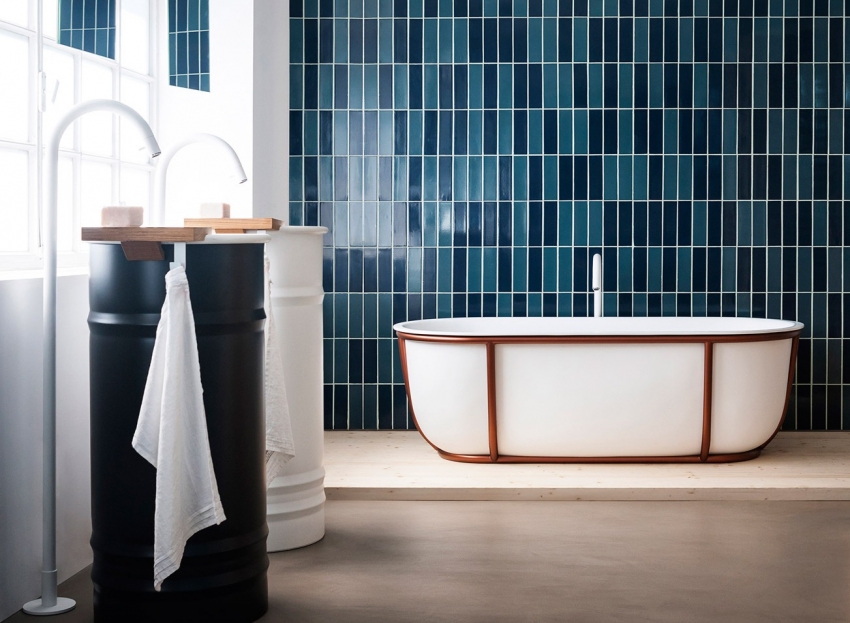
Cast iron bathtubs can have a wide variety of external design, which allows you to use them for arranging any interior
How to choose a cast iron bathtub?
When choosing a product made of this material, experts advise paying attention to the quality of the enamel. The enamelled coating must be solid, without any visible defects (chips, cracks, roughness, etc.).
When installing such a structure, it is necessary to pay special attention to the material from which the floor is made. Experts strongly advise against installing a cast iron model in a room that has wooden beams. This is due to the heavy weight of the cast iron structure.
Modern cast iron models can be equipped with hydromassage equipment, which greatly affects their cost. The price of such a bath can reach 150 thousand rubles. Less technologically advanced models are available in the price range from 30 to 50 thousand rubles.
The size of cast iron baths is the main parameter that affects their choice. In accordance with the dimensions, there are three types of these products:
- small bathtubs (length 120 or 130 cm, and width - 70 cm);
- standard (length 140 or 150 cm, and width - 70 cm);
- large (bath length - 170, 180 or 185 cm, and width - 70, 85 cm).
For a small room, it is recommended to purchase corner cast iron baths. Such a model will save the usable area of the room.
Related article:
Acrylic bath: sizes, shapes and an overview of popular products
How to choose the right size for your bathroom. Popular manufacturers and models of bathtubs. Price policy.
Steel baths - an alternative to cast iron
If you pay attention to the performance characteristics of steel bathtubs, they are most reminiscent of acrylic models. However, they are positioned as an alternative to cast iron structures. Among the advantages of steel products, one can note: low weight (30-40 kg), affordable cost, as well as a rather long service life. With normal use, a steel bathtub can last 25 to 30 years.
Helpful information!In order to retain heat in a structure made of this material, it is recommended to use the principle of a closed space under the bath. It must be filled with inexpensive thermal insulation material that will extend the cooling time of the water. Ordinary polyurethane foam is also suitable for these purposes.
The main disadvantage of steel models is a high thermal conductivity coefficient. Such a bath loses heat very quickly. The soundproofing qualities of the steel model are also very weak.
The light weight of the steel structure requires the organization of a reliable fixation so that the bath does not budge during operation.
The following types of steel structures are distinguished by shape:
- rectangular;
- ovoid (oval);
- corner;
- round.
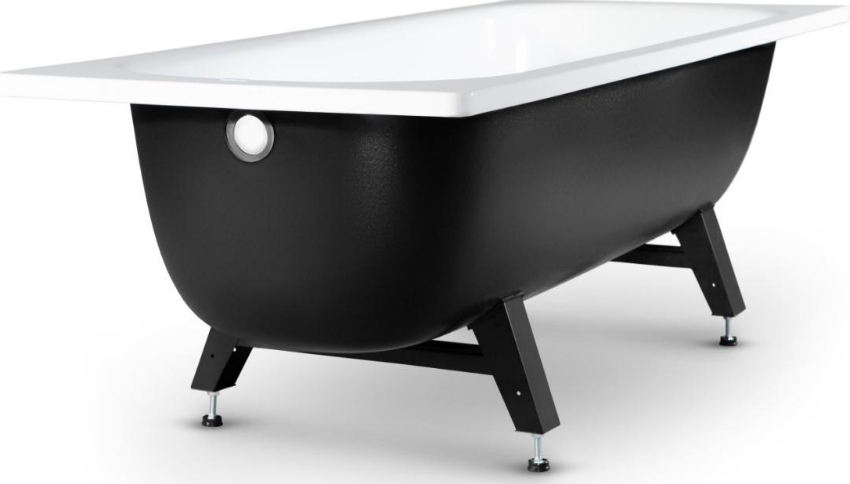
A steel bathtub usually has adjustable legs, which is very convenient when installing the structure itself and the screen to it
Steel models are often equipped with additional elements necessary to increase the comfort of use. These elements include: armrests, handrails, hydromassage equipment. The coating applied to steel can be enamel or modern polymers. The cost of such baths is usually the lowest.
Acrylic bath - a modern option for the bathroom
Acrylic models occupy the most extensive niche in the sanitary ware market. Their popularity is due to their acceptable cost, good technical characteristics, and a variety of models. The range of acrylic baths is incredibly wide, which allows you to choose the right model for a specific case. They differ in size, shape, and color.
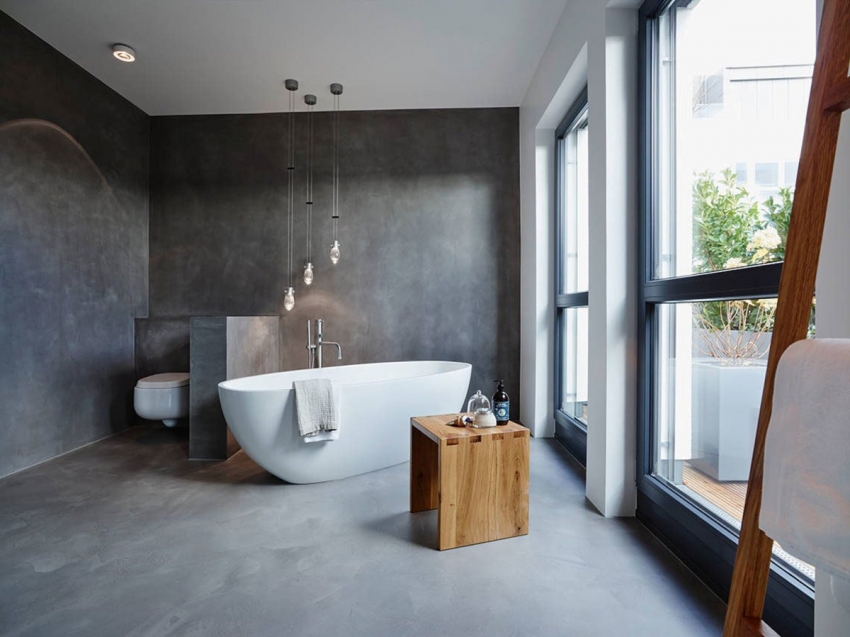
Acrylic bathtubs are quite easy to install as they have a foldable design consisting of a bowl, pedestal and screen
Acrylic baths are lightweight. The weight of such products ranges from 15 to 20 kg, which greatly simplifies their installation. Various manufacturers provide a 7 to 15 year warranty for such baths.
Which baths are better for choosing? Acrylic products are manufactured using two main technologies. The table below shows two types of acrylic structures, depending on the manufacturing technology, as well as their main characteristics and differences.
| Acrylic Item Type | Specifications |
| Cast acrylic (100%) | Products made of acrylic sheets are of high quality and meet all the declared advertising characteristics. |
| ABS / PMMA + acrylic | ABS is a polymer used to reduce the cost of production. Therefore, this material has a negative effect on the technical characteristics of the baths. The acrylic layer in this design is only 10% of the total thickness. The main disadvantage of an ABS / PMMA product is its low strength. |
The following types of acrylic structures are distinguished in shape:
- rectangular;
- ovoid (oval);
- round;
- bath droplets;
- multifaceted options.
Particularly noteworthy are the compact drop-shaped bathtubs. They are great for small spaces and can minimize the loss of space in a small space. There are various sizes of small baths. Prices and photos of these products can be studied using the manufacturers' catalogs.
Acrylic models have an attractive appearance, which is an important factor in their popularity. The low coefficient of thermal conductivity of acrylic material does not allow water to cool quickly. Acrylic has good sound insulation.
Where to buy bathroom bathtubs and tips for use
A bathtub for your bathroom can be purchased both in a construction hypermarket and in a specialized store. You can also choose and buy this sanitary product on the market. If necessary, you can order a bath via the Internet using the search bar of any browser.
The use of acrylic models requires compliance with some operational rules. The chemicals used to care for the bathroom require careful selection. It is not recommended to use abrasive products. Also, experts advise not to put various containers in the bath. This applies not only to metal basins, but also to products made of plastic.
Important!Acrylic is a very temperature-sensitive material. Therefore, it is necessary to monitor the temperature of the water when filling the bath. The surface of the acrylic structure can melt at 160 ° C.
In the event of defects on the acrylic surface, you can repair them yourself. To do this, you need to use a special polish, which can be found in any specialized store.
Quaril bathtubs for bathrooms
Quartz products are made from a mixture of acrylic material with quartz. Such baths have high technical characteristics and aesthetics. Consider the main advantages of quarian models:
- good resistance to mechanical stress (shock);
- noiselessness;
- low thermal conductivity;
- high hygiene;
- large selection of forms.
They weigh more than acrylic counterparts. This is due to the fact that quartz sand is added to the composition of quartz.
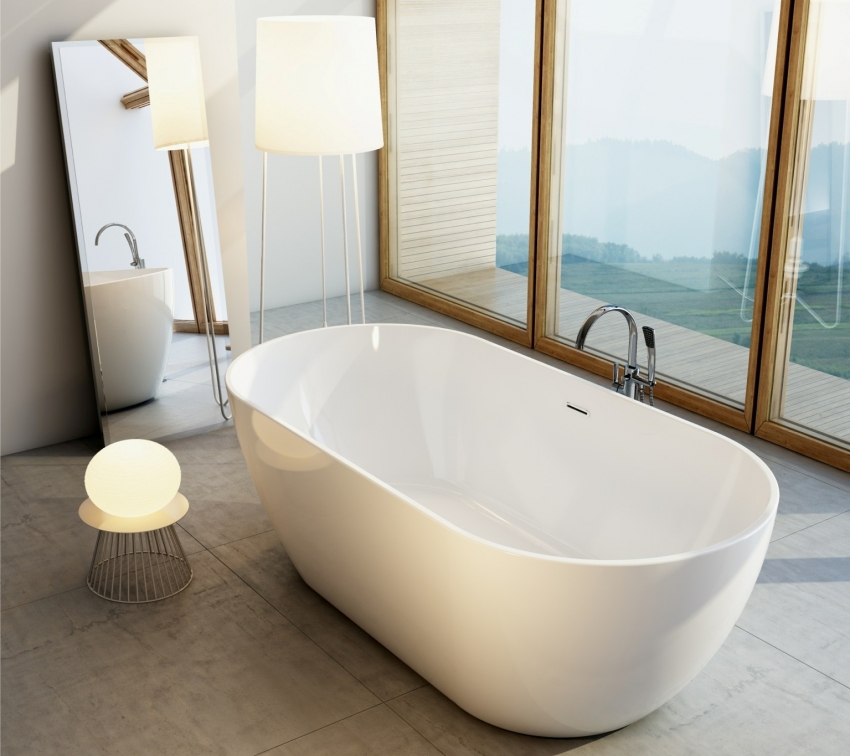
Quaril baths, as well as acrylic counterparts, are presented in a large assortment of shapes and sizes
Due to the acrylic component, the quaril bath can deform as a result of high temperatures. Therefore, it is not recommended to draw too hot water into such models.
For the manufacture of quaril baths, the casting method is used. The forms that are used in the production process can be very different. The color range of such bathtubs, as a rule, is represented by pastel tones, but there are also radical colors (for example, black). The smallest bathtub of this type is 120 cm long, and the largest is 180 cm.
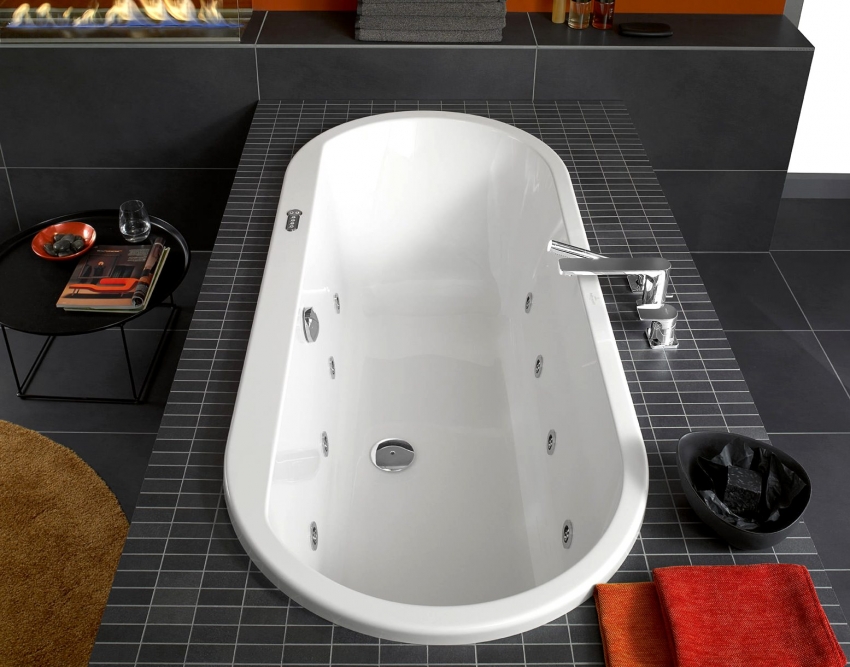
Quaril bathtubs can be equipped with additional hydromassage functions, but such models are much more expensive than conventional ones
The main distinguishing feature of the quaril construction is its functionality. Most of the models of such baths include hydro and air massage equipment, armrests and headrests. Some designs have built-in radios and other high-tech options.The presence of such functionality is reflected in the cost of this product.
Ceramic baths - exclusive products
Ceramic bath models are among the least common. This is due to their high cost as well as fragility. From a practical point of view, such bathtubs are not the leading ones in the sanitary ware market.
Let's consider the main advantages of ceramics:
- low thermal conductivity;
- noiselessness;
- long service life.
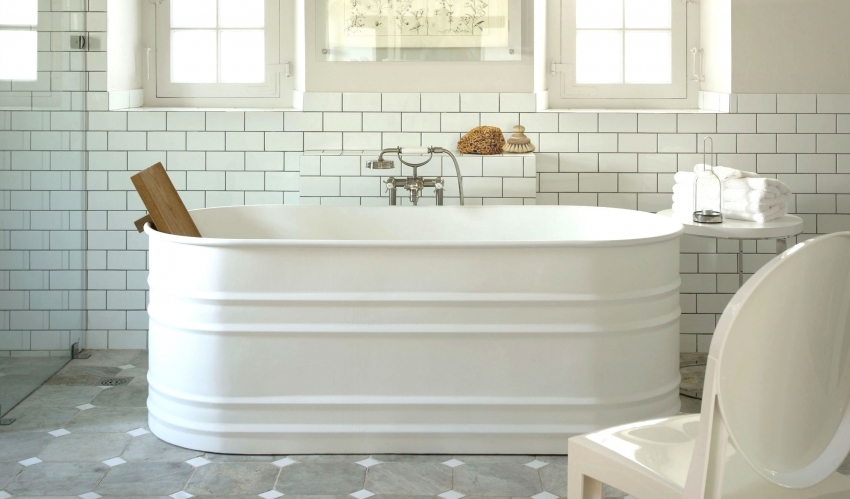
Ceramic baths are quite fragile, so they are often externally decorated with other materials, such as steel, copper or mosaic tiles
Among the disadvantages of ceramics are:
- high price;
- heavy weight;
- weak resistance to mechanical stress (shock).
Due to the fragility of ceramic sanitary ware, it is difficult to transport and install it. Most often, ceramics are made to order for a specific interior.
Artificial stone baths
Products made from natural stone look expensive and elegant. Such a model can become a decoration of any bathroom interior. For the manufacture of a structure made of artificial stone, several components are used, including: a soft filler, a binder (polymethylacrylate), and stone chips.
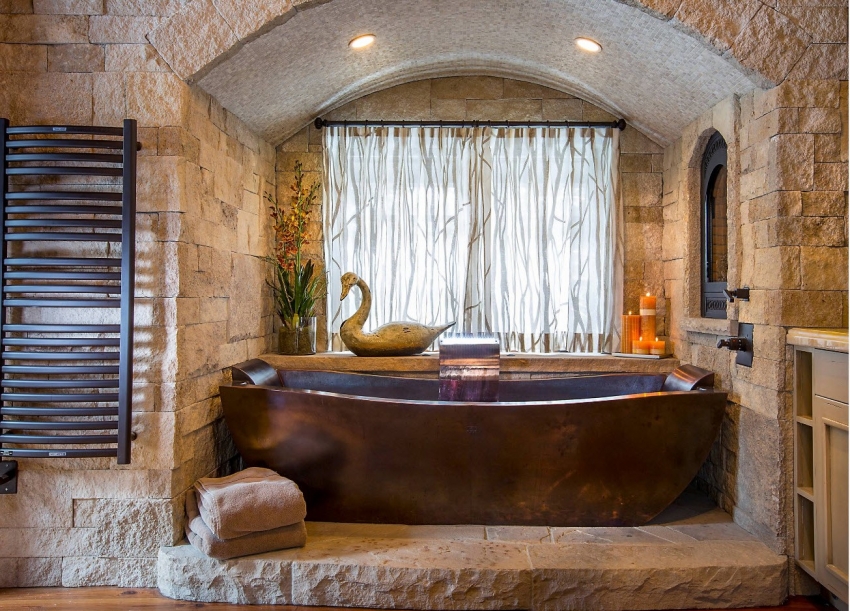
Bathtubs made of unusual materials are rarely found in regular stores, so before buying it is better to familiarize yourself with the options in the online catalogs.
Plumbing equipment made of artificial stone has high technical characteristics. Even natural stone cannot compete with artificial material.
Note! Many manufacturers call products made of artificial stone environmentally friendly. However, this is not quite true. The acrylic resins in these baths are capable of releasing chemical compounds.
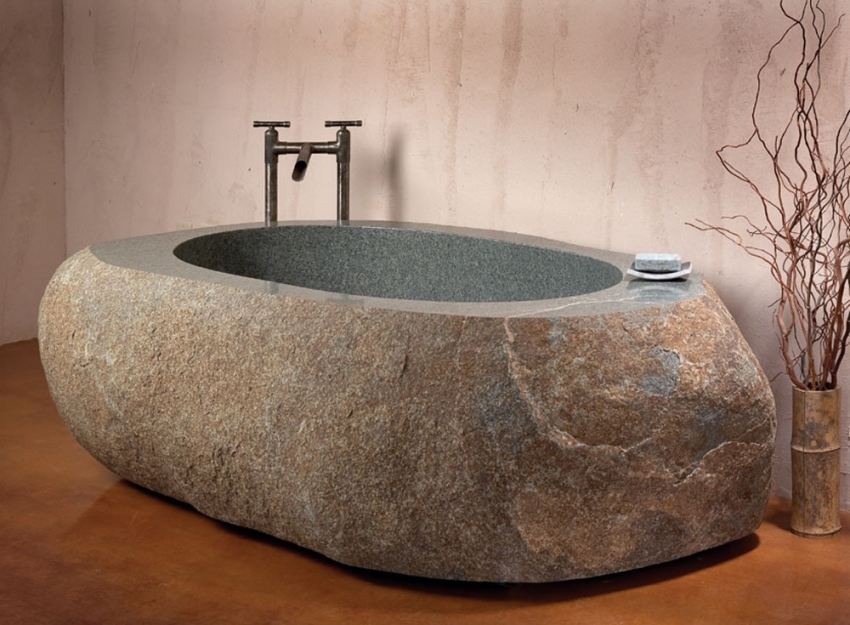
The creation and installation of a bathtub made of natural stone is not only an expensive undertaking, but also quite lengthy
Such products are distinguished by a number of positive qualities:
- high strength characteristics, shock resistance;
- good coefficient of plasticity;
- relatively weak thermal conductivity (lower than that of baths made of natural stone);
- noiselessness.
Consider the main disadvantages of bathtubs made of artificial stone:
- high price;
- large mass;
- poor environmental friendliness.
Products made of artificial stone can be additionally equipped with hydro and air massage equipment. Today, such baths have a wide range of colors, which allows them to expand their operational area.
Bathroom bathtubs made of natural stone and exotic materials
Models made from natural stone are distinguished by the largest mass and the highest cost. They are used very rarely, usually for exclusive bathrooms. The installation of such models is considered a difficult and responsible task, therefore it requires highly qualified specialists. Artificial and metal structures are superior to natural stone sanitary ware in terms of technical characteristics.
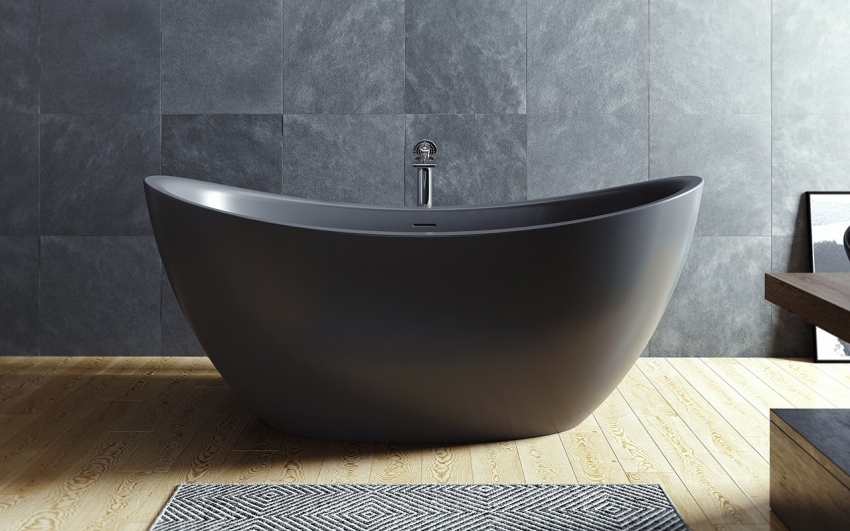
Artificial stone baths can emit toxins, so when buying such a product, it is important to pay attention to quality certificates
Bathtubs made of marble are very popular. They are very expensive, however, they are very aesthetic and are often used as interior decoration. Due to the large mass of such products, soundproofing qualities are inherent in them.
Today you can find plumbing equipment from a variety of materials. Various companies produce bathtubs from non-standard, exotic materials, such as:
- wood;
- glass;
- concrete.
Wooden structures look the most impressive and can decorate any interior. However, in the case of such structures, a certain pattern can be traced - you must pay for the style with technical characteristics. Often, bathtubs made of exotic materials go well with mirrors.
The advantages of wooden bathtubs include:
- environmental friendliness;
- pleasant natural smell that enhances the relaxation effect when taking a bath.
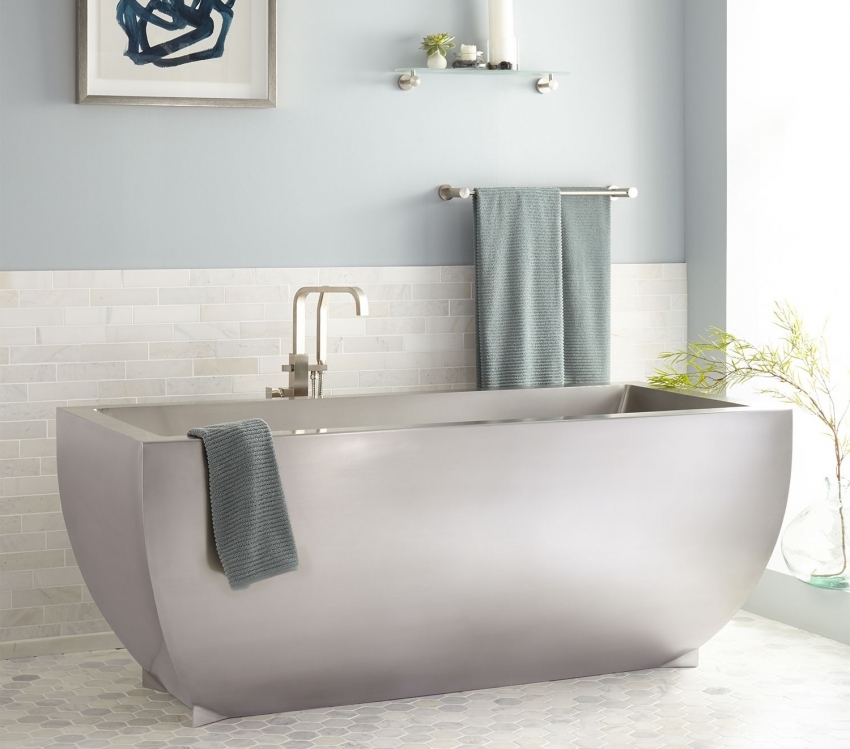
When choosing a bath, it is important to take into account its dimensions and placement of communications
Glass and wood models have many drawbacks. The main disadvantage of such structures is considered to be a high thermal conductivity coefficient. The water in such baths cools down very quickly. Plumbing fixtures made of exotic materials are large in size.
The dimensions of the bathrooms in which such structures are installed significantly exceed the standard indicators.
Helpful information! Wooden, glass and concrete models have other disadvantages as well. Glass is very fragile, which makes storage, transportation and installation difficult. The tree has a weak resistance to moisture. Concrete models are heavy and poor in performance.
Bathtub sizes for bathrooms
Modern bathtubs are made from different materials and come in a wide variety of shapes. Thanks to a wide range of these products, anyone can choose the right model that fits the size of a particular room.
The almost unlimited variety of shapes and sizes greatly simplifies the process of choosing a bath for the consumer. According to the form, the following bath options are distinguished:
- rectangular;
- oval;
- round;
- corner;
- sedentary.
Features of classic rectangular and oval baths
Any materials can be used for rectangular models. The most common rectangular bathtubs are acrylic and cast iron. The standard length of the rectangular design is 180 cm.The width of the standard sample baths is 80 cm.
Classic rectangular models are best suited for standard, small rooms. Rectangular structures can have a length of 120 to 180 cm.The width of this type of bathtub varies from 70 to 80 cm.
Oval models are distinguished by the fact that they have laconic and soft shapes that perfectly contribute to relaxation. In most cases, such structures are equipped with hydromassage equipment. There are also products with built-in air massage.
The disadvantages of oval models include the absence of additional elements used for convenience (armrests, headrests). The standard length of an oval bath is between 140 and 210 cm. For small rooms, a short oval bath is best suited.
The oval bathtub is the perfect solution for a standard bathroom or for a larger room. The materials from which the oval models are made can be very different. The most common are oval acrylic designs.
Varieties of round baths
Round baths belong to the exclusive model range. Depending on the size, there are two main types of round products:
- double;
- multi-seat.
The main functional purpose of such a bath is to create a relaxing effect. This is due to the fact that the design of this form is most suitable for placing hydromassage equipment.
The diameter of the round structure ranges from 140 to 210 cm. Regardless of the diameter of the round model, a lot of space is required for its installation. Therefore, it is not suitable for installations with limited space. The most correct way to place a round bath is to organize an approach from all sides.
Round relaxation structures are made from the following materials:
- acrylic;
- steel;
- cooked;
- fake diamond;
- a natural stone.
Helpful information! For older people, sedentary models are often purchased, the depth of which ranges from 60 to 80 cm.
Comfortable water procedures in a round bath primarily depend on its size. To increase the depth of the bath, the shallow side method is often used. This method allows you to achieve an increase in depth without adding bulk.
Corner baths - practical and compact
Corner bathtub models are rightfully considered the most rational choice for a small bathroom. Such baths seem cumbersome and have a specific shape, however, it is they that allow you to organize the space of the room. The most common are drop or truncated drop models. Bath dimensions droplets depend on the symmetry of the shape.
When choosing an angular model, you need to pay attention to the following points:
- the corner model can be "right" and "left". It depends on the design and on what angle such a design is made for;
- the choice of a corner bath should also take into account that it can be both symmetrical and asymmetrical.
Corner structures are made of acrylic material. If necessary, you can order a bath from another, more expensive and effective material (for example, artificial stone). In most cases, plumbing products of this type are equipped with hydromassage equipment and other useful functions.
Small bathtub for small bathroom
In some apartments, the bathroom is combined and its area is 3.5 m2. The dimensions of such a room are (2.2x1.6 m). The short side of the room, which is 1.6 m long, can be used to install the bath. This arrangement of the bath will allow you to place other plumbing fixtures in the room (toilet, sink etc.).
Which baths to choose for installation in such conditions? The most suitable option for installation in such a situation is a rectangular short bath (120 cm). However, the width of the short side of the room allows for a longer model (140 cm). The smallest bathtub on the market will have a length of 100 cm.
In addition to the rectangular model, you can also install an asymmetric angular one. The peculiarity of the asymmetric corner design is that it has one wide side and one narrow side.
Huge bathtubs for bathrooms: photos and characteristics
Separately, it should be said about the sit-down bath models. Many consumers are skeptical about such products, however, they are still very popular.This is due to the convenience of such designs. The sitz bath has the following advantages: compactness and versatility.
The seated model is a great option for hygiene procedures. Especially such designs are recommended for the elderly, for whom a very important aspect when choosing a bath is its convenience.
Note! In some cases, seated structures are combined with shower cabin.
In the plumbing market, you can find a large selection of sit-down tub sizes for small bathrooms. Seated corner models are used to save usable floor space.
The use of such a bath allows not only to save room space, but also to reduce the consumption of water used for hygiene procedures. Every year manufacturers expand the range of sit-down mini-baths.
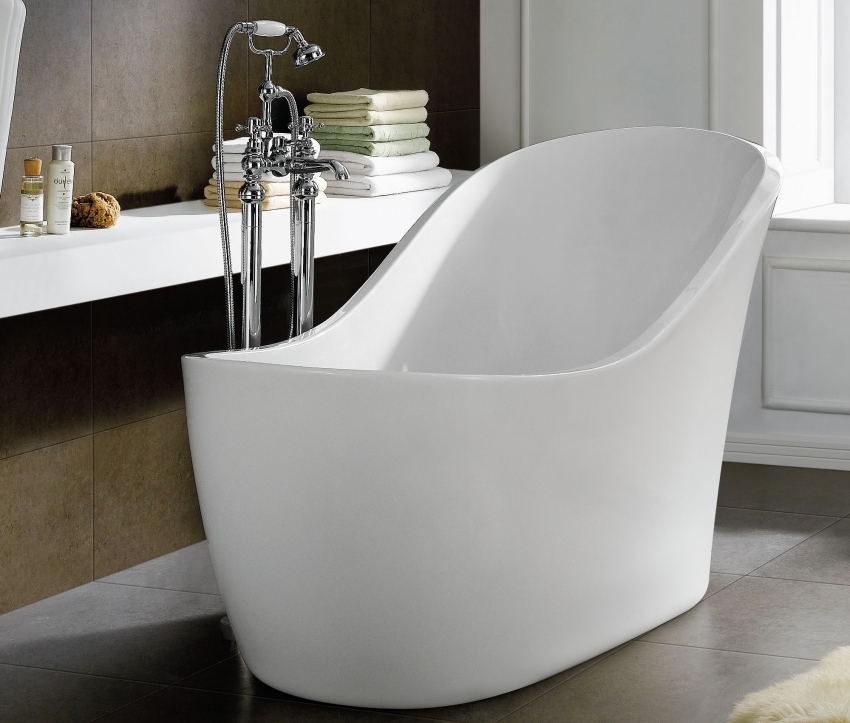
An example of an interesting bathroom model that does not take up much space, but at the same time is quite roomy
Which bath to choose? Bath Tips
Before purchasing a bath, experts advise paying attention to some of the nuances of their choice. Consider the recommendations that will help answer the question of how to choose the right baths:
- the dimensions, as well as the shape of the bath, in any case, should be selected for the area of a particular room;
- it is recommended to purchase models, the installation of which is not too difficult;
- the design of the bath should take into account the location of water and sewer pipes. Otherwise, there will be difficulties in its installation. The siphon and additional elements necessary for the operation of the bath must be purchased simultaneously with the bowl;
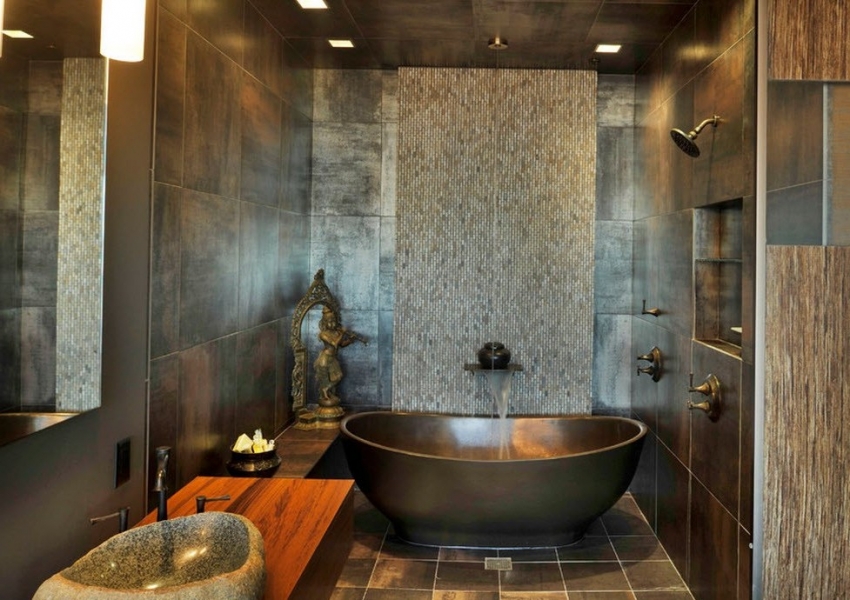
When buying a bathtub, the kit includes all the necessary fixtures, hoses and even taps with a shower
- it is very important to make sure that all auxiliary components are made by the same manufacturer as the bowl;
- for children and the elderly, it is recommended to purchase designs in which special attention is paid to safety. For safety and ease of use, handles are installed on the bathtubs, and their bottom is anti-slip;
- when choosing this sanitary ware, it is necessary to take into account the growth of all family members. The depth of the bath should correspond to the physical capabilities of the residents;
- Before buying a bath, carefully study its inner surface. It should not contain any defects (cracks, chips, roughness, etc.). Examination of the outer surface is also encouraged;
- it is advisable to buy products from well-known brands, as this will reduce the risk of purchasing a low-grade, defective design.
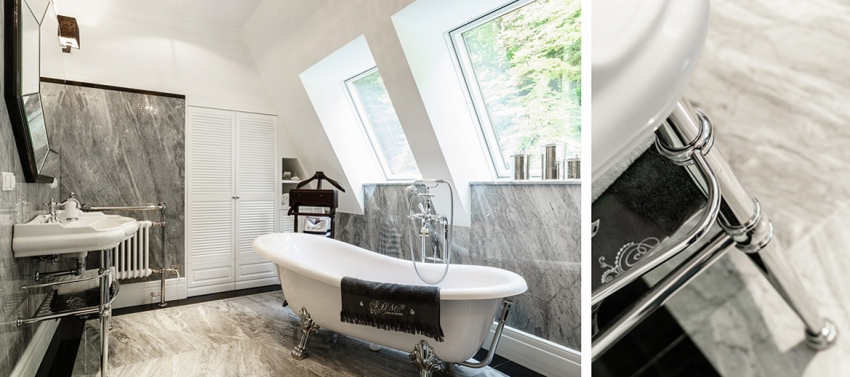
When buying a bathtub, you should pay attention to small design details, because it is by them that you can determine the quality of the product
The above recommendations help answer the question of how to choose a bath for a particular room. In any case, when choosing the required model, the dimensions of the bathroom and the personal preferences of the owners of the apartment or house are taken into account.
Bathtub prices for bathrooms
Cast iron models, as mentioned above, are inexpensive. The price of a domestic cast-iron bath ranges from 10 to 15 thousand rubles. Foreign cast iron products cost approximately 2 times more.
The cheapest acrylic bathtubs of domestic production can be purchased for 7-8 thousand rubles. On average, the cost of such products is in the range of 10-12 thousand.
Helpful information! In the case of purchasing a structure made of any material, equipped with additional options, the cost, as a rule, rises by 20-50%.
Consider the prices for bathtubs from other, less popular, materials:
- steel - 5-10 thousand rubles;
- kvaril - from 30 to 70 thousand rubles;
- artificial stone - from 30 to 250 thousand rubles;
- natural stone - from 150 thousand rubles to several million.
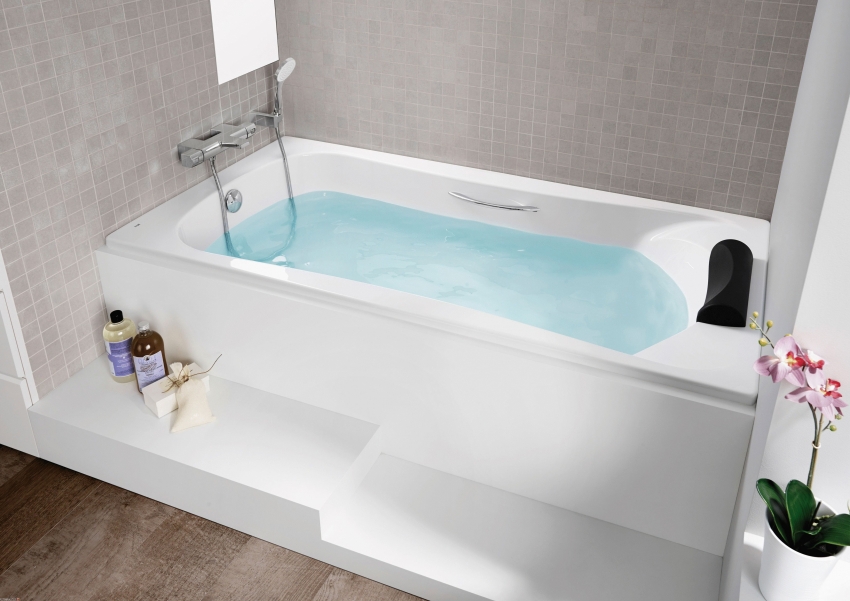
The cost of the bath depends on the material from which it is made, the country of the manufacturer and also on the built-in functions
The cost of glass baths ranges from 145 to 500 thousand. The least common are wooden bathtubs, the price of which varies from 200 thousand to 3-4 million rubles.
Many sites that specialize in selling bathtubs often arrange various promotions that are aimed at attracting buyers. Therefore, on the Internet there is an opportunity to purchase bathroom baths inexpensively. Bath sales can save you money, however, you need to be careful not to buy low quality products.
